AR-RISALAH ISU 41

ARABISASI
JUL - DEC 2023
AR-RISALAH
Isu 41 (Jul – Dec 2023)
ISSN 2424-8207
Editor
Ustaz Dr Mohammad Yusri Yubhi Bin Md Yusoff
Pembaca Pruf
Ustazah Maisurah Binti Mohamed Rafii
Penyumbang Makalah
Ustaz Zubair Bin Mohd Redza
Ustazah Sharifah Inshirah Aljunied
Ustaz Huzhaifah Bin Mohd Kamal
Ustaz Sheikh Mohamad Farouq S/O Abdul Fareez
Ustazah Zahratur Rofiqah Binte Mochamad Sandisi
Ukhti Nuhaa Fithriyah Binte Isa
Arahan Seni & Pereka Grafik
A. Haikal Bin Haron
Penerbit
Persatuan Ulama dan Guru-Guru
Agama Islam Singapura (Pergas)
448 Changi Road
Wisma Indah
#03-01
Singapura 419975
Tel: 6346 9350
Fax: 6346 3450
Email: info@pergas.org.sg
Connect with us
fb.com/Pergas.Singapore IG: @pergassingapura
KANDUNGAN
01.
K ALAM EDITOR
Ms 1
youtube.com/PergasSingapura
Get in touch
www.pergas.org.sg
The publisher and editor are unable to accept any liability for errors that may occur and any consequences arising from the use of information contained in the magazine. The reviews expressed do not necessarily reflect those of the publisher and editor. The publication of advertisements and advertorials within the magazine do not constitute any endorsement by the publisher and editor of the contents therein.
Ar-Risalah is published by Pergas with permission from the copyright owner.
ALL RIGHTS RESERVED. No part of this publication may be reproduced, stored or transmitted in any form, for any reason or by any means, whether re-drawn, enlarged or otherwise altered including mechanical, photocopy, digital storage and retrieval or otherwise without the prior permission in writing from both the copyright owner and the publisher, except in the case of brief quotations embodied in critical articles and reviews.
02. FOKUS
Ms 3 – Correcting Misconceptions
Surrounding Arabisation
Ms 7 – Arabisation: Paranoia or Reality?

03.
EKONOMI ISLAM
Ms 14 – Beyond Numbers: Envisioning Values
Within Islamic Financial Literacy
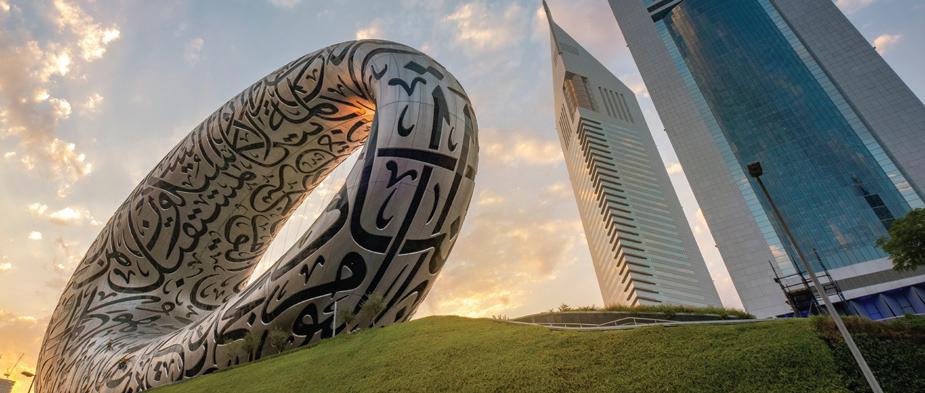
04.
K ENALI ASATIZAH
Ms 23 – Ustaz Sheikh Mohamad Farouq S/O Abdul Fareez
06.
T INTA ILMU: ULASAN BUKU
Ms 43 – “Perempuan Yang Baik-Baik Dalam Al-Quran”
Ms 47 – Sajak by Ustazah Zahratur Rofiqah
Binte Mochamad Sandisi
05.
A KTIVITI PERGAS
Ms 27 – Diari Kegiatan Pergas (Jul - Dec 2023)
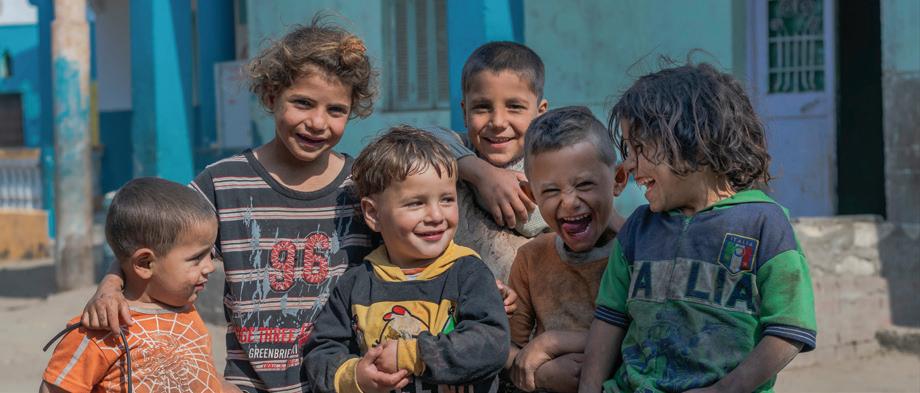
KALAM EDITOR
Dengan Nama Allah Yang Maha Pengasih
Lagi Maha Penyayang
Selawat dan Salam ke atas Nabi Muhammad, Ahli Keluarganya dan Para Sahabat serta setiap yang mengikuti perjalanan mereka
Assalamualaikum wr. wb.
Para Pembaca yang dikasihi sekalian,
Sebagai kesinambungan daripada tiga keluaran yang lalu, Ar-Risalah kali ini akan membincangkan tentang tema ‘Arabisasi’. Tema ini merupakan penutup tirai bagi diskusi isu-isu yang pernah dibincangkan semasa Muktamar Ulama 2021 dahulu.
Sebelum ini, Ar-Risalah pernah membawakan isu keganasan domestik, LGBTQ+ dan kepimpinan bukan Islam. Kesemua isu ini merupakan antara isu yang dibincangkan ketika Muktamar Ulama yang lalu.
Seperti sebelumnya, tema tentang arabisasi ini juga akan turut dikupas melalui lensa wasatiyyah; yakni dengan pendekatan yang adil, terbaik dan juga seimbang. Mungkin timbul persoalan kepada para pembaca, mengapakah tema ini dipilih? Di manakah relevannya diskusi tentang tema arabisasi ini kepada masyarakat Islam Singapura pada hari ini? Sebenarnya tema tentang arabisasi ini sangat relevan untuk kita fahami dari sudut kaitannya dengan agama Islam, ini kerana kitab suci Al-Quran itu sendiri diturunkan dalam bahasa Arab. Begitu juga dengan salah faham daripada sebahagian masyarakat Islam sendiri bahawa setiap yang datang dari budaya Arab merupakan
sebahagian daripada Islam. Ini belum termasuk beberapa kenyataan daripada pihak-pihak tertentu yang menganggap terma-terma Islamik dalam bahasa
Arab seperti hijab, iftar, eid dan lain-lain sebagai bermasalah dan boleh menjejaskan kesepaduan sosial antara kaum di Singapura.
Bagi memberikan penjelasan tentang tema
arabisasi, Ar-Risalah akan membawakan
dua artikel berbahasa Inggeris dalam
ruangan ‘Fokus’ bagi menangani isu ini.
Artikel pertama merupakan tulisan Sharifah
Inshirah Aljunied, yang merupakan graduan
Universiti Jordan dalam bidang Bahasa
Arab dan Kesusasteraan. Artikel beliau
bertajuk, ‘Arabisation: Paranoia or Reality?’, menyentuh tentang cabaran arabisasi dari
sudut kebudayaan kepada masyarakat
Melayu Islam. Pada masa yang sama, beliau juga menjelaskan tentang pengaruh bahasa
Arab daripada sudut agama Islam itu sendiri
dan keperluan umat Islam untuk mempelajari
dan menghayatinya. Beliau seterusnya
menyarankan bahawa pertimbangan yang
lebih seimbang dalam pendekatan terhadap
isu arabisasi ini ialah untuk memastikan
agar budaya Melayu tidak terhakis daripada
sebarang ancaman luar termasuk arabisasi, serta pada masa yang sama, menggalakkan
pemahaman Islam yang menyeluruh dan nilai-nilai mulia agama.
Tulisan kedua yang juga dalam bahasa
Inggeris, merupakan artikel daripada Ustaz
Zubair bin Mohd Redza. Beliau merupakan
lulusan sarjana muda dalam bahasa Arab
dan Kesusasteraan daripada Universiti Islam
Antarabangsa Malaysia (IIUM). Beliau kini merupakan asatizah di Madrasah Alsagoff
Al-Arabiah bagi bidang pengajian agama
dan juga bahasa Arab. Tulisan beliau yang bertajuk, ‘Correcting Misconceptions
Surrounding Arabisation’ menyentuh tentang keperluan untuk menguruskan salah faham yang berlaku terhadap isu arabisasi beserta dengan saranan dalam menangani hal ini.
Beliau menjelaskan bahawa salah faham terhadap isu arabisasi ini antaranya berlaku
berikutan penularan pakaian menutup aurat
bagi Muslimah yang berasal dari negaranegara Arab serta semakin banyak trend penggunaan terma-terma berbahasa Arab dalam kehidupan umat Islam pada masa
kini. Menurut penulis, pengaruh pemakaian
dan juga bahasa Arab dalam kehidupan masyarakat Melayu Islam tidak sedikit
pun menjejaskan atau menghakis budaya
dan bahasa Melayu, bahkan integrasi ini sebenarnya saling menyokong antara satu sama
lain. Beliau memberikan contoh penggunaan terma-terma berbahasa Arab ini akan membuatkan umat Islam lebih memahami agama dengan lebih baik, kerana agama Islam itu sendiri kebanyakannya bersumber daripada Al-Quran yang diturunkan dalam bahasa
Arab. Ini seterusnya dapat menimbulkan kecintaan terhadap bahasa Al-Quran dan selanjutnya membuka pintu penghayatan terhadap Islam dengan lebih mendalam.
Kami berharap dengan terbitan kali ini yang berkisar tentang isu arabisasi ini bakal memberikan panduan kepada para pembaca tentang pendekatan wasatiyyah, yakni adil, terbaik dan seimbang dalam menangani isu ini. Pendekatan wasatiyyah ini sangat penting
agar umat Islam tidak bersikap melampau atau ekstrem dalam menangani perkara arabisasi ini. Pendekatan yang adil, terbaik dan seimbang di sini bukanlah dengan menganggap segala yang berasal dari negaranegara Arab sebagai semestinya pendekatan yang islamik, sehingga menghakis budaya dan tradisi kemelayuan yang juga padat dengan dengan nilai keislaman seperti kelembutan, kesopanan dan kesantunan. Pada masa yang sama, usah juga kita menolak arabisasi secara total, kerana bahasa Arab juga merupakan bahasa Al-Quran dan banyak istilah-istilah syarak menggunakan terma berbahasa Arab seperti solat, zakat, haji dan sebagainya.
Akhir kalam, ingatlah, Islam merupakan agama yang mudah dan tidak menyulitkan. Ia menerima segala hasil karya manusia termasuk kebudayaan selama mana ia sejajar dengan pandangan Islam. Segala perkara tersebut pula mestilah selaras dengan nilainilai mulia agama Islam dan tidak meliputi perkara kemungkaran yang seharusnya mesti ditolak. Selagi mana ianya bertepatan dengan ajaran Islam yang sentiasa menyeru kepada perkara kebaikan dan tidak bertepatan dengan perkara keburukan, maka ianya tiada isu di sisi agama. Moga umat Islam terus dipandu dengan nilai-nilai mulia dalam kehidupan, baik dalam interaksi antara kita dengan Tuhan, mahupun sesama manusia agar kita berjaya dalam kehidupan di dunia dan di akhirat kelak. Amin.
Salam hormat, Mohammad Yusri Yubhi Md Yusoff Editor, Ar-Risalah.
1 2
Correcting Misconceptions Surrounding Arabisation
 By: Zubair bin Mohd Redza
By: Zubair bin Mohd Redza
Degree in Arabic Language and Literature, International Islamic University Malaysia
Educator in Arabic and Religious Knowledge, Madrasah Alsagoff Al-Arabiah

INTRODUCTION
In the field of academia and research, the concept of Arabisation has been interpreted in a negative light. This article addresses the misconceptions surrounding it and clarifies that they are baseless and uncalled for, along with suggestions on how best we can move past the issue at hand.
Misconceptions Surrounding Arabisation
Arabisation is largely interpreted to be the cultivation and adoption of an Arab-oriented consciousness, which implicitly advocates for the limiting of ‘one’s current practices and understanding of Islam that do not conform to Arabic standards.1.
Fundamentally, this concept is flawed. This is because adopting an Arab-oriented consciousness does not totally lead to the condemnation of practices and cultures which does not conform to Arab standards.
For example, if a person were to use the Arabic word hijab instead of the Malay word tudung, the former does not serve to negate the latter. Rather, hijab is a term that includes not only the tudung but also the selendang, abaya,
FOKUS FOKUS
Photo Contributor: Abie Davies
3 4
1 Shukul, Raaj Kumar (2023). The Role of Arabisation in Harming Social Cohesion in Singapore. Singapore: RSIS.
niqab, and burqa. This shows that adopting an Arab-oriented consciousness shows the increased Islamic consciousness among the community.2.
Dr Nazaruddin Zainun mentions in relation to the future of the Malay language: “Borrowing language only means that the Malay language will progress. And progression also involves welcoming new words. Language is flexible, it has to be otherwise it would not evolve.” 3.
Additionally, in the context of the Malay language mixing with another one, he says: “Our Malay culture still triumphs. It is happening everywhere around the world, not just in Malaysia. Hence, we cannot say we are losing our Malay identity, customs and traditions to the Arab culture.”
History of Arabisation
A brief picture of its history is necessary to understand how this issue came about. It can be traced back to the late 80s and early 90s, when the common wearing of the Malay baju kurung is complemented by the Arabic jubah, a one-piece shapeless cloth that drabs down the shoulder all the way to the ankle.4.
In addition, Muslim males also brought in parts of the Arab culture to Southeast Asia. They started to throw shawls over their right shoulders, putting on turbans or at least a songkok (a Muslim cap). White was the colour of choice, but other colours were worn too. Moreover, to carry it to the next level, some Muslim caps even had a symbol of the Prophet’s sandal imprinted or sewn on it.
These were not limited to attire, as Arabic words also started to be used in everyday conversation and transactions. The terms akhi and ukhti were used alongside saudara and saudari. Other words related to religion such as sembahyang, buka puasa, derma, mas kahwin and majlis kahwin were also complemented with their Arabic terms, namely: solat, iftar, sedekah, mahar and walimah.
Correcting Misconceptions Surrounding Arabisation
From here, we can clearly see that Arabisation is being interpreted by academia in a negative light due to the apparent issue of the gradual loss of Malay culture and customs to the conforming Arabic culture. As proven earlier in the article, this is not the case, rather the Arabic language and culture are being integrated into the Malay tradition in a way where one complements the other.
In addressing the issue of the gradual loss of the Malay language and culture, one should study the threat of secularization. This is where the use of the English at the expense of the e Malay language, the mother tongue.
In coining the term Arabisation, a fair interpretation within the Southeast Asian sphere will be the cultivation and adoption of Arab-oriented consciousness without losing the main language and culture in the region, Malay. The Malay language will never be in danger of losing to the Arabic language because Malay is a much simpler language. The real threat of its degradation comes from secularization and over-exposure to English, which should be the real worry.
2. Yahya, Dr Firdaus (2017). On Arabisation: Understanding the Negative and Positive Aspect of it. Singapore: Pergas.
3. Dr Nasaruddin Zainun is a Senior Lecturer at USM, and specialises in Socioeconomics History.
4. Al-Attas, Syed Farid (2016). Against The Grain: Arabisation and The Malay Identity. Malaysia: The Edge.
This phenomenon prompted the coining of a term, which led to the eventual emergence of two concepts: Islamisation and Arabisation. While Islamisation is a globally accepted term, and it denotes the trend and aspiration among Muslims to ensure the conformity of all aspects of their daily lives to Islamic precepts, the term Arabisation only appeared in discussions at the turn of this century, and peculiarly more so in the Southeast Asia region than others.5.
5 Ghoshal, Baladas (2010). Arabisation: The Changing Face of Islam in Asia. India: Sage Publications.
English is being pushed aggressively as a means for writing and conversation, and it is now a struggle to write, converse and even read Malay scriptures. 6.
The Arabic language is not the problem. It is a means for a person to understand Islam better. This is because the Quran was written originally in Arabic. Our Islamic Knowledge is derived from books written originally in Arabic. Hence, it is with a deeper connection with the Arabic language that one unlocks a door to appreciating Islam.
That being said, the mindset that the Arabic language and tradition are superior and more Islamic has to be corrected, as this has no foundation in Islam. Wearing different types of headgears or jubahs common to different Arab cultures does not make one more pious. Rather, we are free to adopt any attire as long as they do not contradict the set of Islamic guidelines and principles.
Conclusion
In conclusion, Arabisation is a useful tool in understanding Islam. It is a mindset which we should adopt critically and not look at negatively so as to not further push the false agenda that the Arabic and Malay culture cancel out each other.
6. Al-Attas, Syed Muhammad Naquib (2023). Islam and Secularism. New Zealand: Qadeem Press.
FOKUS FOKUS
5 6
Arabisation: Paranoia or Reality?
By: Sharifah Inshirah Aljunied
Bachelor’s In Arabic Language & Literature, The University of Jordan.
Al-Falah Mosque Marketing Committee Intern & Part-Time Educator at ILHAM (aLive)
INTRODUCTION
Arabisation is a discourse that has pervaded in the latest century, most particularly in the region. Echoes of thought and concerns have risen with the notion that Arabisation is a growing threat that ‘aims to strip away’ the Malay Identity. The question we ask is this; how far is Arabisation an ominous enemy, or are we simply just wrapped in a delusion of paranoia? In order to understand Arabisation, a proper analysis and breakdown of the term should be done to shed light on the issue.
Understanding Arabisation
In the face of a growing trend and popularity amongst locals in adopting Arab cultures, practices and religious doctrines, it is no wonder why certain members of the community - usually social activists - find a need to unpack the elephant in the room and see a need to address certain concerns and fears that ought to be clarified. In the
realm of this discourse, there are multiple camps who lean toward two different yet overlapping views on Arabisation; the first is rather antagonistic to the concept, while the next is nonchalant and sees no issue in the matter, especially in an age of globalisation, where the interlacing of cultures becomes inexorable.
The Arabisation Scare
Opponents of the Arabisation wave have blatantly mentioned that the trend is a threat to the authenticity of the Malays, and a localised brand of Islam must be revived in order to safeguard the culture within the region. In the words of Marina Mahathir, a social activist and founder of Sisters In Islam in Malaysia, she alludes that the challenge of finding traditional “baju Melayu” for women during Hari Raya as Arab attire like kaftans became more popular instead. She pointed out that Malay women below the age of fifty generally do not know how to

tie the ‘baju kurung’ skirt so that “it falls into pleats and makes it easier to walk in”. Marina Mahathir attributed this to Arabisation. She suggests, “This is just Arabisation. Our culture – it is colonialism, Arab colonialism…But what happened to our tradition, culture, everything?” 7. Her interpretation of Arabisation, however, 7. Zahiid, S. (2016, 24 May), Forum explores creeping ‘Arabisation’ among Malays. Malay Mail. https://www. malaymail.com/news/malaysia/2016/05/24/forum-explores-creeping-arabisation-among-malays/1126197
is directed to the minute details of Malays today favouring Arab ‘clothes’ over native ones and sees these small attributes a source of the deterioration of the Malay culture. This concern is valid with the supposed intention of safeguarding a localised brand of Malay Islam and Malay culture. The problem is when this term takes a massive (and rather unexpected leap) to equate Arabisation as exclusivist, absolutist and more pertinently, a ‘Salafi-Wahabi agenda’.
Dr Farid Al-Attas alludes that Malays have become ‘inferior’ to the Arab strand in the pursuit of being more religious and sees this group as simplistically equating Islam to Arab. In his words, the Malays are known to ‘ape’ the Arabs and believe that such is a more authentic way of being Muslim. Al-Attas fears that the growing number of Malays who have turned to this absolutist strand will cause a more prominent problem, which is adopting a despotic approach in understanding, interpreting and practising Islam. This then will lead to further problems in the multi-cultural, inclusive and pluralist community that obligates Muslims to integrate with society and keep up with progressive trends and objectives.
This then opens up another series of discussions to the discourse, such as where the source of Arabisation may come from and whether or not graduates from Middle
FOKUS FOKUS
7 8
Eastern universities who become Ulama’ in the community have further aggravated the problem as they adopt Middle Eastern views, ideologies and practices that have caused part of the influence in Arabising the Malay Community, be it in Singapore, Malaysia and Indonesia.
The growing concern about Arabisation is an amalgamation of a myriad of issues packed in one arbitrary term, which leadspacked in one arbitrary term, leading us to think; what exactly is the problem?
Arabisation: Friend or Foe?
Back at home, this Arabisation woe has spurred conversation amongst specialists and academics. The reality is that this discourse is not something that is widely abided by nor renounced on the ground and is not typically a topic of concern. This stems from a number of factors, partly due to the fact that Arab culture is already a part of the Malay community since the acceptance of Islam in the region and that Islam is and will always be related to Arabs, more specifically, the Arabic Language. The two, like it or not, are intertwined and has seeped into the Malay culture centuries ago and cannot be undone unless - hypothetically - Malays turn to a different faith en masse. This shows us one thing, Malays were an open and adaptable race that embraced the so-called ‘Arab culture’ ever since the first arrival of
Arab Muslims into the region. They were not exclusivists and found Islam to be everrelevant to their nature, which allowed for a large conversion of Malays into Islam amidst many other factors.
As we fast forward to today, it is an accepted fact that ‘Malay’ is most equated to ‘Muslim’ (though there is an undeniably small percentage of Malays who are non-Muslims, which will not be discussed in the article), and Islam and the Arab culture, tradition and language are part and parcel of this identity. The simplest example is the Qur’an (i.e., the primary source of Islam) which is written in the Arabic Language, and anyone who is a Muslim must understand and learn the basics of the language to fulfil tenets of the religion, such as prayer. This then leads us again to another question; so if Arabisation is such a

threat, is the Qur’an not also a manifestation of Arabisation at its basic level? It may be deduced that if a local brand of Islam is such a concern, then why do we then accentuate the need to read, understand and learn the Qur’an – which is in the purest form of ‘Arabic’?
While the reality that Malays are losing their identity remains salient and an issue that should be addressed, making Arabisation a scapegoat as a cause of this phenomenon is not entirely fair. This is due to a few factors; the first being an overstating and inculpating Arabisation as the primary cause of the erosion of the Malay culture, when many other prominent threats have intensified this shift, namely globalisation and other cultures that the current generation prefers, apart from the Arab culture. Why is there then no strong censure on other cultures or languages like the English, Korean or Indian culture that has also somewhat crept into the Malay culture as well?
The next concern is the issue of absolutism, which is the apprehension brought forth by numerous personalities that liken Arabisation to ‘Salafi-Wahabi’, ‘Islamist’, ‘Jihadist’ and the growing concern that Muslims in this part of the region have grown more zealous in understanding Islam in its depth, leading to a growing interest in religiosity. This is, however, not the essence of Arabisation in the first place, and if absolutism was
indeed the concern, then the problem is not in Arabisation but exclusivism in any form, which should be addressed at its due time and place. Additionally, it is unfair to conclude that Arabisation is only a byproduct of Saudi Arabia’s strand of Arab and Islam. Sufi Tariqahs and strands also incepted from the Arab world and should also be included as a form of Arabisation since it came from a different part of the Arab world. Thus, the conjecture that Arabisation is the equivalent to a threat, more specifically a symbol of conservatism, is a straw man argument that fails to recognise blind spots and the real problem at hand. Without recognising or admitting the real problem, the solutions to the so-called ‘issues’ remain fuzzy, and loopholes and gaps will remain apparent in dissecting such an extensive term.
Arabisation: Unpacked
In giving justice to the debate, local scholars such as Dr Firdaus Yahya have cited that Arabisation is a double-edged sword and there are two types of Arabisation; negative and positive.8. Positive Arabisation, as he suggests, is seen when Malay Muslims start to be more predisposed in learning the Arabic Language and using it in the Malay 8 Yahya, F. (2017, June 1). On Arabisation: Understanding the negative and positive aspect of it. PERGAS Blog. https://blog.pergas.org.sg/wasat/on-arabisation-understanding-the-negative-and-positive-aspect-of-it/
FOKUS FOKUS
Photo Contributor: Izzuddin Radzak 9 10
vernacular. It may be questioned that if the Arabic Language were to be the preferred language amongst the Malays, would this not cause the eradication of the mother tongue. The answer to this is no, as the Malay language is malleable in its nature and a much simpler language than Arabic.
Negative Arabisation, as proposed by Dr Firdaus Yahya, is more ideological, especially when certain Malays conform to the fallacy that Arab cultures, manners, customs and diets are superior and inherently ‘Islamic’, such as suggesting that wearing the Niqab is a symbol of ‘piety’. Even so, the issue here is not in Arabisation at its core but a superiority complex that is baseless and superficial due to a feeble interpretation of Islam and its philosophy.
In conjunction with this, Dr Khairudin Aljunied mentions that Arabisation is seen as multi-faceted and has evolved into different spectrums for different reasons. Arabisation is a broad; ranging from linguistic Arabisation, cultural Arabisation broad term, ranging from linguistic Arabisation, cultural Arabisation, and religious Arabisation, each related to different aspects of ‘Arab’. There is no specific Arabisation, and the conclusion from his perspective is that there is no issue with Arabisation, and the discourse should
not be overemphasised.9. Other scholars, such as Dr Walid Jumblatt, take a stronger stance and opine that the discourse is simply one that is inundated with problematic undertones that are ambiguous, superficial and racist. Additionally, there is no reason to be petrified of a heightened sense of religiosity amongst the community in today’s context, and this fear is a result of an orientalist paradigm that promotes the idea that any form of culture that is foreign, exotic and different, is considered backward and dangerous.10.
Conclusion:
Is Arabisation worth discussing?
There are starkly different views on the concept of Arabisation. It is clear that although there is a spectrum of thoughts and views that either promote or dissent this movement, the issue has never posed as an extremely alarming threat to the people on the ground. What we do need to address, and may be the bigger issue is absolutism, which stems from an insufficient understanding of the true essence of Islam. This is the true problem that needs to be countered by 9 S., Othman Alkaff, S., H., (2021) Muktamar Ulama 2021 Conference Kit. In Y. Mohammad (Eds.), Arabisation (pp. 44). Singapore Islamic Scholars and Religious Teachers Association (PERGAS)
10. Razak, M. (2019, April 15). The Problem with the Discourse of ‘Arabisation’. The Karyawan. https://karyawan.sg/the-problem-with-the-discourse-of-arabisation/
professionals or the knowledgeable in the community (usually referred to the Asatizah and specialists).
This would take the spirit of constant reform spearheaded by the intelligentsia and professionals to strategise innovative ways to counter the issue through modes such as social media and outreach with suitable methodologies. It should also be highlighted that a heightened sense of religiosity within the community is a reality that should not only be acknowledged but should be celebrated and seen as a positive thing rather than a menace.
It can also be concluded that Arabisation is not an issue that should be magnified to the extent that it generalises and jumps to the simplistic deduction that blames Arabisation as the cause of all evil and paints certain ‘conservative’ groups as an issue that would disrupt the harmony and peace in society. Such an argument, ironically, is itself considered bigotry that seeks to combat another supposed bigotry. Indeed, the problem is not in Arabisation but the prevalent gaps in upholding and maintaining cultural values (particularly the Malay culture) and spreading the proper values of Islam, which should then be the main emphasis and antidote to the concerns proposed.
Wallahu A’lam Bissowab.
References
Abdul Fareez, S., M., Hassan, A., S., Nizam, N., S., Othman Alkaff, S., H., (2021) Muktamar Ulama 2021 Conference Kit. In Y. Mohammad (Eds.), Arabisation (pp. 40 - 55). Singapore Islamic Scholars and Religious Teachers Association (PERGAS)
Abdul Rahman, N., Ibrahim, A., Saat, N. (2021) Reaching for the Crescent: Aspirations of Singapore Islamic Studies Graduates & Challenges, Singapore: ISEAS - Yusof Ishak Institute
Ghoshal, B. (2016, July 19). Arabisation of Islam in Asia: A clash within civilisation. The Straits Times: Opinion. https://www.straitstimes.com/opinion/arabisation-ofislam-in-asia-a-clash-within-civilisation
Hashmi, T. (2015, July 14). Arabisation of Bangladesh. The Daily Star. https://www.thedailystar.net/op-ed/ arabisation-bangladesh-112009
Razak, M. (2019, April 15). The Problem with the Discourse of ‘Arabisation’. The Karyawan. https://karyawan.sg/theproblem-with-the-discourse-of-arabisation/
Saat, N. (2015) Faith, Authority And The Malays. Singapore: Select Publishing
Saat, N. (2018), Competing discourses: Among Malaysian Muftis: Still a case of Arabisation?
N. Saat (Ed.), Islam in Southeast Asia: Negotiating Modernity. (1st Ed., pp. 35 - 62) Singapore: ISEAS - Yusof Ishak Institute
Saat, N. (2018, August 15). Arabisation and the threat to Singapore culture. Today Online. https://www.todayonline.com/commentary/ arabisation-and-threat-singapore-culture
Sidek, O. (2019, July 31). Understanding Islam from original sources not Arabisation. The Straits Times: Opinion. https://www.straitstimes.com/forum/letters-on-theweb/understanding-islam-from-original-sources-notarabisation
Yahya, F. (2017, June 1). On Arabisation: Understanding the negative and positive aspect of it. PERGAS Blog. https://blog.pergas.org.sg/wasat/on-arabisationunderstanding-the-negative-and-positive-aspect-of-it/
Zahiid, S. (2016, 24 May), Forum explores creeping ‘Arabisation’ among Malays. Malay Mail. https://www.malaymail. com/news/malaysia/2016/05/24/forum-explorescreeping-arabisation-among-malays/1126197
FOKUS FOKUS
11 12
Beyond Numbers
Envisioning Values Within Islamic Financial Literacy
 By: Huzhaifah Kamal
By: Huzhaifah Kamal
MSc
candidate
in Islamic Finance from INCEIF University BA in Islamic Jurisprudence, University of Jordan BSc in Accounting and Finance, University of London. Research assistant at ISRA Research Management Centre

INTRODUCTION
The recognition and importance of financial literacy are rapidly expanding, becoming more entrenched and valued across various communities worldwide. While the rate of financial literacy is still relatively low, especially in Asian economies (between 40%-60%), there is a trend for growth, alluding to its importance within societies. Low financial literacy has shown that it has negative impact not only on individuals, especially in times of crisis, but also on the economy.11. A survey by the National Financial Educators Council (NFEC) revealed that the lack of financial literacy cost Americans a total of $388 billion in 2023.12. This statistic demonstrates the pressing need for comprehensive financial education. The global drive towards equipping individuals with essential financial literacy skills is increasingly viewed as a fundamental step towards fostering more sophisticated and resilient economies.
11. Fong, J., Koh, B., Mitchell, O., & Rohwedder, S. (2019). Financial literacy and suboptimal financial decisions at older ages. SSRN Electronic Journal. https://doi. org/10.2139/ssrn.3473614
12 Field, B. (2023, December 22). Financial Illiteracy costs: Survey, causes, consequences | NFEC. NFEC. https://www.financialeducatorscouncil.org/financial-illiteracy-costs/
EKONOMI ISLAM EKONOMI ISLAM
Photo Contributor: Abie Davies
13 14
Financial literacy, grounded in the principles of effective money management and efficiency, is undeniably crucial. It encompasses a deep understanding of investments, wealth planning, and the utilisation of productive financial products, all aimed at enhancing individual well-being and mitigating broader societal financial vulnerabilities. The burgeoning market for financial literacy services reflects its growing demand and the recognition of its value. However, this raises a pertinent question: If financial literacy is already a well-established and widespread service, what specific role does Islamic financial literacy play?
The prefix of ‘Islamic’ in disciplines and products
The addition of the ‘Islamic’ prefix to various disciplines and industries indeed prompts a debate over its necessity and implications. In certain contexts, like ‘Islamic Banks,’ the prefix serves a definitive purpose. It signifies a fundamental redefinition and recontextualisation of financial institutions traditionally based on Ribā (usury), which is prohibited in Islam. By adopting the ‘Islamic’ label, these institutions declare their compliance with the Sharīʿah, establishing its distinction as a deviation from the traditional notion of what a conventional bank stands for.
Yet, when this prefix is applied to areas not inherently contrary to Islamic principles,
such as ‘Islamic Economics,’ ‘Islamic Psychology,’ or in this case ‘Islamic Financial Literacy,’ it raises questions about the actual intent and value of this redefinition. Economics, as the study of resource allocation and human behaviour, and psychology, focusing on understanding cognitive behaviours and theories, are disciplines aimed at comprehending the world and human interaction within it— goals not inherently contradictory to Islamic teachings. Furthermore, financial literacy — which encompasses the enhancement of one’s financial standing and the adoption of a conscientious stance towards personal financial management, is also one that aligns with Islamic principles, which call for Muslims to plan and be perceptive to their disposition and future.

Umer Chapra alludes to this in his book
‘The Future of Economics: An Islamic Perspective’13., suggesting that using the ‘Islamic’ prefix, in fact, helps Muslims focus their discussions within an Islamic framework, aiding in reaching a consensus. It’s not just about labelling but about embedding an Islamic perspective into the study and practice of these disciplines. For example, while financial literacy includes managing investments, budgeting, and debt, Islamic financial literacy integrates these with an ethical and moral framework based on the Sharīʿah, aligning economic and financial decisions with Islamic teachings from the Quran and Sunnah. The ‘Islamic’ prefix, therefore, isn’t just a label; it’s a declaration of aligning with a comprehensive Islamic worldview, ensuring that all engagements are within the bounds of Islamic ethics and laws. So, the next question becomes, what then is Islamic financial literacy, and what does it entail? 3. Chapra, U. (2016). The Future of Economics: An Islamic Perspective. https://openlibrary.org/books/ OL16264546M/The_future_of_economics
Islamic Financial Literacy – An Added Value Dimension

The term ‹financial literacy› refers to a set of behavioural patterns—a blend of awareness, knowledge, skills, attitude, and behaviour—critical for making informed financial decisions and achieving individual financial well-being.14. Although both conventional and Islamic financial literacy aims to achieve financial well-being, they diverge in their foundational value framework. Islamic Financial Literacy, as with any concept prefixed with ‘Islamic’, is based on extrapolating set rules and principles from the divine sources defined by the Sharīʿah: the Quran and Sunnah.
While the concept of financial literacy is broadly recognised as a social construct, emphasising skills like saving and budgeting to navigate economic challenges, Islamic financial literacy extends this foundation by integrating a moral and ethical framework believed to originate from Divine principles. This integration aims to guide financial
14 Bhabha, J. I. (2014). Impact of financial literacy on Saving-Investment Behavior of working women in the developing Countries. Research Journal of Finance and Accounting, 5(13), 118–122. https://www.iiste.org/Journals/index.php/RJFA/article/download/14341/14649
EKONOMI ISLAM EKONOMI ISLAM
15 16
behaviours along a path that is not only economically sound but also religiously sanctioned.
In this context, Islamic financial literacy does more than merely acknowledge the importance of prudent financial management. It imbues these practices with deeper significance, aligning them with a broader spiritual and ethical mission. For instance, while conventional financial literacy advocates the necessity of saving and budgeting as tools for individual security during economic downturns or unexpected hardships, Islamic financial literacy embraces these principles and enriches them with the additional dimension of religious responsibility. This includes, but is not limited to, the obligations a Muslim has towards their family and community.
Therefore, in Islamic financial literacy, saving and budgeting transcend mere economic activities. They become acts of faith and responsibility, ensuring that one’s financial decisions not only safeguard personal wealth but also uphold a commitment to the well-being and support of one’s family and community. This paradigm shift adds a profound layer of meaning to one’s value proposition, reinforcing the decision-making process to extend beyond personal gain.
It fosters a holistic view where financial prudence is seen as a means to fulfill both
worldly needs and spiritual obligations, thus enriching the individual’s life with purpose and direction.
A God-Conscious Framework
Islamic financial literacy not only encompasses the basic tenets of managing money effectively but also critically assesses and reinterprets elements of conventional financial literacy through the lens of Sharīʿah principles. It introduces a nuanced ethical dimension to financial activities, emphasising not just general moral principles like fairness and transparency but also the specific concepts of permissibility (Halal) and impermissibility (Haram). This approach clarifies a clear ethical framework that aims to prevent any form of deception or exploitation, ensuring that all financial activities contribute positively to individual and societal welfare.
Unlike conventional finance, which may promote certain practices based on secular ethical standards, Islamic finance derives its guidelines from the Quran and Sunnah, providing a comprehensive set of rules that govern financial transactions. These guidelines cover a wide array of activities and decisions, from the types of investments that are permissible to the manner in which contracts should be structured and executed.
By doing so, Islamic finance not only seeks to prevent harm and unfairness but also to
promote a positive and constructive financial environment. This permissibility framework is extensive, touching on various aspects of financial dealings. For instance, it prohibits investments in industries that contradict Islamic ethics, such as those involving alcohol, gambling, and Ribā. It also discourages excessive speculation (Gharar) and ensures that all transactions are conducted with utmost transparency and mutual consent.
Islamic scholars have delved deeply into understanding the ‘ʿIllah’ (underlying reason) behind the prohibitions prescribed in Islamic law, particularly those relating to financial transactions. They recognise that many prohibitions, such as those against Ribā (interest), Gharar (excessive uncertainty), and investments in Haram (forbidden) industries, are aimed at preventing economic oppression, injustice, and the spread of ‘Fasād’ (corruption or destruction) within the community. These elements contribute to societal imbalance and individual hardship, and their prohibition is meant to ensure fairness, equity, and social welfare.
However, where the ‘ʿIllah’ is not explicit or not clearly evident, some scholars conclude that the deterrence presents as a form of ‘Taʿabbudīyah’ (worship through obedience), signifying submission to divine
commandments for God’s pleasure alone.15. This element of ‘Taʿabbudīyah’ precedes the extrapolation of ‘ʿIllah’, signifying that regardless of whether there is clear harm or not, the pursuit of embodying “God’s commandment” is an advocated endeavour in and of itself. This is the reason why, even whenever Ribā seems financially justified, when one engages in a loan of a negligible 0.1% interest (conventional finance would justify this as the cost of the loan), regardless of the consensual nature of the transaction, it is still prohibited and should be abhorred.
Islamic financial literacy involves this deepseated commitment to divine directives, acting as a moral compass in financial decisions. While the pursuit of understanding the ‘ʿIllah’ behind Islamic injunctions is a valuable endeavour, it is the element of ‘Taʿabbudīyah’ that ultimately guides a Muslim’s actions and decisions. This reflects a profound level of faith and devotion, where the primary goal is not merely to avoid harm or ensure personal benefit, but to embody and honour God’s commandments, thereby cultivating a spiritually and ethically centered life.
15. Ibn Abd al-Salam, Abu Muhammad ‘Izz al-Din. Qawa’id al-Ahkam fi Masalih al-Anam. Maktabat al-Kulliyat al-Azhariyya - Cairo. Vol. 1, p. 22.
EKONOMI ISLAM EKONOMI ISLAM
17 18
Beyond Rules and Numbers – Islamic Social Finance
It is crucial to recognise that Islamic Financial Literacy extends beyond understanding the domain of impermissibilities and personal financial management. While it is true that financial literacy involves personal financial management, along with awareness and engagement with various financial products in the market, Islamic financial literacy encourages a broader view. It promotes the concept of personal financial management as a means to contribute to the greater good of the community, not just the individual.
For instance, Muslims are encouraged to give and donate consistently, regardless of their financial position. This principle is encapsulated in the verse, “Never will you attain the good [reward] until you spend [in the way of Allah] from that which you love.” . 16. This concept might seem to contradict the typical value of personal financial management, which often focuses on wealth accumulation and growth as measures of financial stability. In Islamic financial literacy, personal finance is seen as a means to attain the Creator’s pleasure. It emphasises that the ultimate investment should not be confined to this temporal world but should focus on the Hereafter.
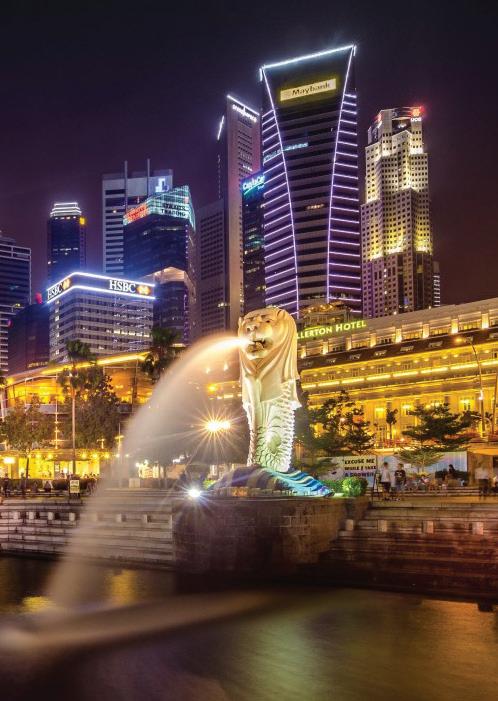
Never will you attain the good [reward] until you spend [in the way of Allah] from that which you love.
16. Quran 3:92 (Surah Ali ‘Imran, Ayah 92)
The development of Islamic Social Finance is paramount in the Muslim community, and its significance should be deeply embedded in every Muslim’s understanding of Islamic Financial Literacy. Islamic Social Finance focuses on developing financial practices that contribute to societal betterment. In the Sharīʿah, it encompasses the application of Zakat, Waqf, Ṣadaqah, and more. It extends to the idea that helping others, even at the
expense of one’s financial position, may be seen as nobler and more logical than what is advocated within the conventional financial literacy goals. This dimension of Islamic Financial Literacy is absent in conventional financial literacy, as the latter does not typically embed the notion of societal good within the framework of personal well-being.
Islamic finance views this aspect as beneficial to the community and the individual, where ultimate satisfaction is derived from the rewards of Allah s.w.t.
Maqa¯s · id al-Shariʿah – A Driver for Sustainability and Social Well-being
The concept of Maqāṣid al-Sharīʿah represents a distinctive and multifaceted framework within Islamic Finance, setting it apart with its deep-rooted ethical and justice-oriented approach. Unlike the broader universal concepts of sustainability and marginal social benefit prevalent in economics and finance, Maqāṣid al-Sharīʿah intricately weaves ethics and justice into its very core. Thus, sustainability and social welfare are not merely options but imperative purposes to be actively pursued by Muslims globally. Maqāṣid al-Sharīʿah, which translates to the objectives or goals of Sharīʿah, articulates a set of divine-inspired rules and principles. Classical scholars typically categorise these objectives into five critical dimensions: Nafs (Life), Dīn (Religion), Māl (Wealth), Nasl
(Lineage), and ʿAql (Intellect).17. In finance, these dimensions form a robust framework guiding individuals towards thoughtful consideration of sustainability and societal impacts. The concepts of Maṣlaḥah (social good) and Mafsadah (harm) is embedded within this framework, compelling individuals to deeply contemplate the broader implications of their actions.
Islamic Financial Literacy encompasses and embraces the Maqāṣid al-Sharīʿah framework, ingraining the principles of promoting Maṣlaḥah and preventing Mafsadah within its ethos. This illustrates that while personal benefit and financial security are essential, any actions contradicting the greater Maṣlaḥah must be avoided. Engaging in unethical investments or finding loopholes in tax or Zakāh (obligatory charity), even if legally permissible, starkly contradicts the values advocated by the Sharīʿah.
Islamic Financial Literacy under the Maqāṣid al-Sharīʿah framework isn’t just about personal financial acumen; it’s a commitment to a broader, ethically sound, and socially responsible financial behavior that aligns with the divine guidance of Sharīʿah. It’s a holistic approach that balances individual welfare with the collective good, ensuring 17 Al-Shatibi, Abu Ishaq Ibrahim bin Musa bin Muhammad al-Lakhmi (d. 790 AH). Al-Muwafaqat. 1st ed. Dar Ibn Affan, 1417 AH/1997 CE.
EKONOMI ISLAM EKONOMI ISLAM
19 20
“ ”
that financial decisions contribute positively to society and adhere to the righteous path outlined in Islamic teachings.
A Pietistic Worldview – Allah s.w.t as Ar-Razza¯q
The worldview that Muslims are encouraged to cultivate centres on faith and piety, guiding them to adopt and advocate a value system deeply rooted in God-consciousness. This principle, pivotal for a financially literate Muslim, asserts that while striving for excellence and continual self-improvement is commendable, every financial action and decision should be grounded in the belief that nothing transpires without the divine will, recognising Allah as Ar-Razzāq, the ultimate Provider. This principle is demonstrated within the verse, “Indeed, it is Allah who is the [continual] Provider, the firm possessor of strength.”.18.
In the realm of Islamic financial literacy, the pursuit of relief from financial hardship is encouraged, yet neither hardship nor poverty is viewed negatively. Instead, Islam positions both wealth and poverty as tests from Allah, opportunities to draw closer to the divine. Wealth does not inherently confer nobility or favour in the eyes of Allah. The true measure of success transcends material possessions, focusing instead on whether
In fact, from an Islamic perspective, poverty and hardship might sometimes be regarded as more spiritually beneficial than wealth, especially if affluence leads one astray from their fundamental duties.19. This worldview emphasises that the ultimate goal is not the accumulation of wealth but rather its ethical acquisition and utilisation in a manner that aligns with one’s responsibilities as a Khalīfah on earth and aids in the journey towards divine contentment. This paradigm shifts the focus from mere financial prosperity to a holistic, spiritually integrated financial literacy that harmonises with one’s deeper purpose and faith.
19. Ṣaḥīḥ al-Bukhārī 3158

18. Quran 50:58 (Surah Adh-Dhariyat, Ayah 58) one’s sustenance is utilised to fulfil the role of Khalīfah (Vicegerent) on Earth and to seek the pleasure of the Creator.
Conclusion
This essay nodoes not merely seek to understand Islamic financial literacy through a traditional financial lens; rather, it endeavours to move beyond the prevailing secular interpretations often imposed on ‘Islamic’ concepts. Indeed, the objectives Islamic financial literacy holds share with the widespread understanding of financial literacy, encompassing financial responsibility and astute wealth management, but emphasising utilising the offerings of Islamic financial institutions and Halal investments.
Yet, the true essence arguably resides in the value system individuals embrace regarding their finances, recognising that wealth is a tool rather than a goal.
This intrinsic value framework is reflected within the Sharīʿah principles. By redefining Islamic financial literacy to align more closely with these values, we can foster the development of the ideal community envisioned by Sharīʿah: a society that not only pursues progress but also champions collective well-being. Such a redefinition is not just a theoretical exercise; it’s a transformative shift that reorients personal finance towards a holistic, communitycentric paradigm.
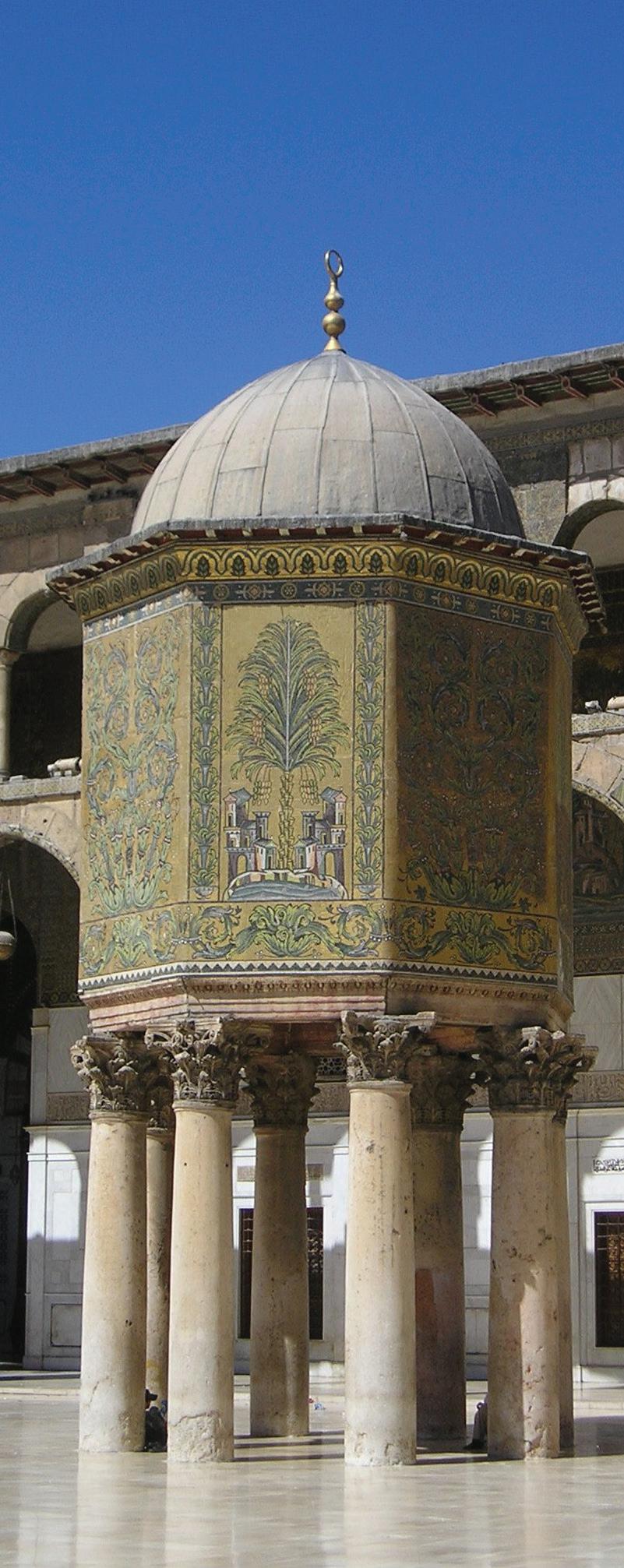
EKONOMI ISLAM EKONOMI ISLAM
21 22

Kenali Asatizah
Ustaz Sheikh MohamadFarouq

S/O Abdul Fareez
Let us start with you telling us more about your educational background. 1 I received my early education from different institutions. I started in a neighbourhood school and later moved to Madrasah, where I spent eight years. My time in Madrasah was an interesting one as I was neither an easy student nor a high achiever. However, the people I met and the teachers who were patient towards me have primarily shaped me as a person. After Madrasah, I left for Malaysia to pursue my bachelor’s degree at the International Islamic University of Malaysia. I majored in Comparative Religion and Usuluddin with a minor in History and Civilization. I fell in love with research during this period and have never looked back. In 2016, I decided to further my studies at Hamad Bin Khalifa University, Qatar, as I became interested in issues concerning human development and ethics. For this reason, I chose to major

in Islamic Thought and Applied Ethics.
Furthermore, it was the only institution that offered a degree in Islamic Ethics. My time in Qatar was fulfilling as I was fortunate enough to be trained by prominent scholars in the field, which deepened my love for my religion and impacted how I see the world and my responsibility to make it a
better place. Furthermore, I was able to see Islam as a civilizational instrument through my interactions with international peers who were also Muslim minorities in their respective countries, including non-Muslims who had a deep interest in studying Islam. More recently, I completed my second Master’s degree in Asian Studies from the S Rajaratnam School of International Studies (RSIS) as I intend to prepare the ground for my next step by bringing together my reading on religion and geopolitics, in particular religious soft power in the Middle East and how it impacts Muslims in Southeast Asia.
How long have you been in the workforce, and could you provide details about your current job, including the scope of your responsibilities?
I have been in the workforce for almost a decade, with six humble years under my belt, working professionally or through my volunteer work closely with the community.
I am currently an Associate Research Fellow for a research program (RPCS) that is part of Muis’ efforts to advance religious thought leadership for the future. Additionally, the program seeks to explore areas like governance, social life, as well as science and technology in hopes of building the foundations for new and contextualised bodies of knowledge that can enrich our religious life and pave the way for a gracious and thriving Muslim
community in Singapore. I am currently working on a research project that seeks to understand the interplay between AI and Islam. This includes ideating new possibilities to harness the creative power of AI to enrich our religious life and, at the same time, exploring ways in which religion can serve as a safeguard to ensure that these technologies remain human-centric and advanced for the common good.

KENALI ASATIZAH KENALI ASATIZAH
2
23 24
I believe engaging in researchbased projects has exposed you to a variety of books. Could you share your top three favourite books?
Reading a book invites you to a whole new world, and I am fortunate enough that my job allows me to visit this imagined world from time to time. It is certainly challenging to select my favourite books as the ones I have read have been formative. But if I have to choose only three, it has to be the works of Edward Said that compelled me to rethink my identity and sense of belonging in the modern world. The Messenger by Tariq Ramadan is a book that inspired me to walk in the footsteps of the Prophet PBUH. And finally, the Little Prince by Antoine de Saint-Exupéry that never fails to rekindle the little kid in me. I think it is important to metaphorically reconnect with our younger selves as adulthood tends to dissipate our sense of imagination and ability to see the value in the little things in life. My favourite quote from the book, “It is only in the heart that one can see rightly, what is essential is invisible to the eye”.


What vision do you have for Pergas?
I have actually written something about this when I was nominated as an MTP member.
“Based on my experience with Pergas and various Malay/Muslim organizations in Singapore, it has broadened my understanding of complex socioreligious issues, both at the local and international levels. I aspire to contribute to the development of Pergas as a respected institution among stakeholders and the general public, particularly in the field of research. Through my research experiences, I hope to assist Pergas in preserving the cultural thought of the Malay/Islamic community in Singapore, aiming to positively impact civic engagement and ensure that institutions like Pergas produce high-quality research and effectively communicate complex information to the general public.”

What are your aspirations for Asatizah to enhance their contributions within the writing/research industry?

Read wide and deep. Do not only confine our readings to books that are familiar to us. Expand our reading list and bring it into conversation with the depth of our rich intellectual tradition. Take time to understand the needs of the community to ensure that the research achieves optimal impact.
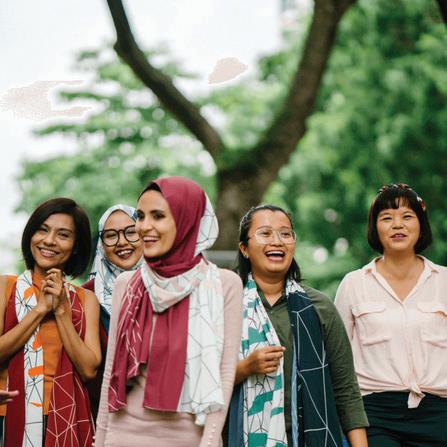



Read and write with a ‘glocal’ mindset. To think ‘Global’ but the heart remains ‘Local’, to use the Islamic intellectual tradition as a starting point/foundation to propel oneself onto the global stage and be part of the larger circles working on emerging issues.
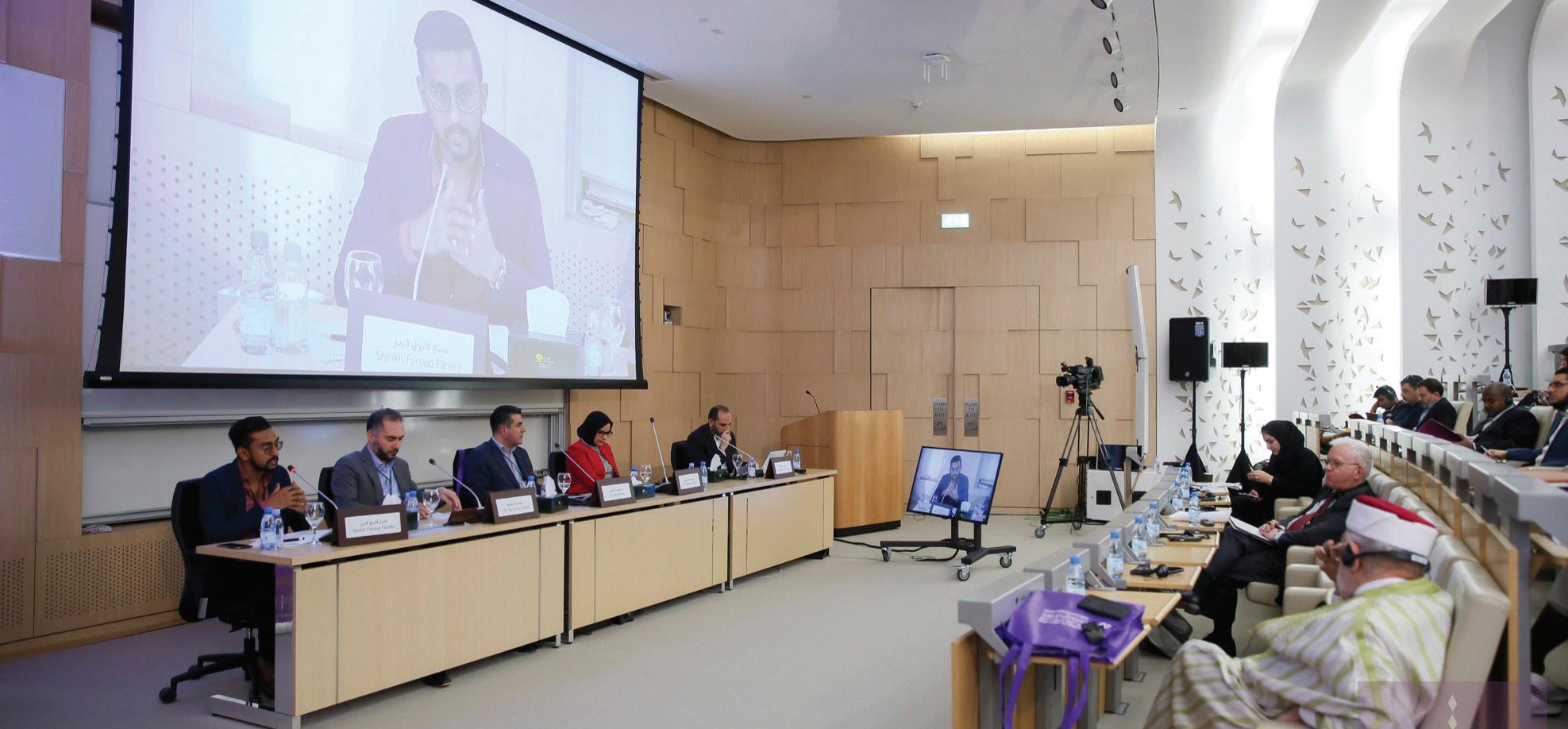
KENALI ASATIZAH KENALI ASATIZAH
3
4
5
25 26
Diari PergasKegiatan
Julai – Disember 2023
4 Julai 2023
Program Radio Pergas bersama
DJ Hos Ustaz Syed Matiin dan
Asatizah Undangan, Ustaz Ahmad Faritz Bin Mohamed Hairudin yang telah mengajak kita mengenali para malaikat Allah agar kita menambahkan keimanan dan ketaatan kita pada Allah s.w.t.

5 Julai 2023
Siri E-Hadith secara LIVE di Facebook bersambung lagi bersama Ustazah Dr Sakinah
Saptu pada 5 Julai 2023 yang telah membincangkan hadith ke-19 (Bahagian 1) tentang bagaimana Allah s.w.t menjaga hambaNya yang taat pada perintahNya.

8 Julai 2023
Hari Orientasi Pelajar Pergas (Hope) diadakan pada 8 Julai bagi Program Takrif Islam, SPI & SLPI secara dalam talian yang dianjurkan oleh Majlis Pelajar Pergas dengan kerjasama pihak Institut Pengajian Islam Pergas.
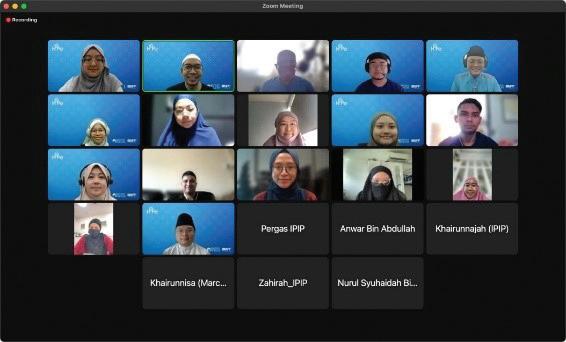


20 Julai 2023
Program Radio Pergas bersama
DJ Hos Ustaz Syed Matiin dan
Asatizah Undangan, Ustaz
Muhammad Farhan Mohamed
Elyas, yang telah membincangkan
mengenai hari kiamat yang sudah
17 Julai 2023
Program Radio Pergas bersama
DJ Hos Ustaz Syed Matiin bersama
Asatizah Undangan, Al-Fadhil
Syakh Yusuf Weltch daripada
New York yang telah berkongsi dengan masyarakat bagaimana untuk memperkasakan diri dengan keindahan dan keberkatan
Muharram, berserta amalan yang boleh diterapkan dalam satu aspek kehidupan seharian, berlandaskan tradisi keilmuan Islam.

semakin menghampiri kita, dan
bagaimana kita boleh dapatkan
Syafaat pada hari tersebut.
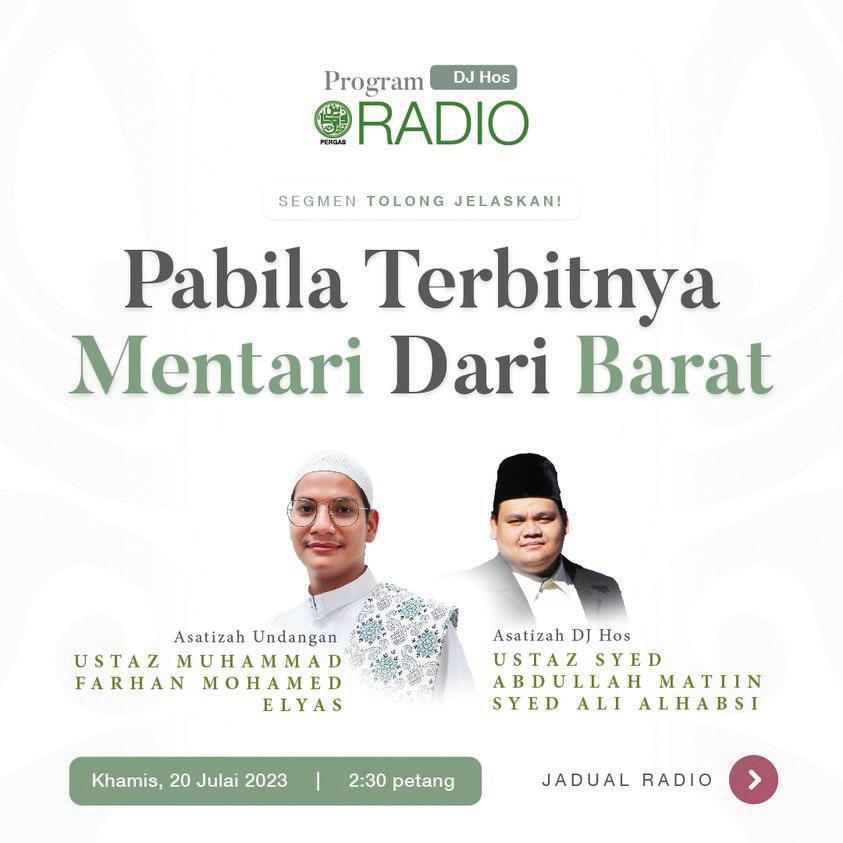
22 Julai 2023
IPIP telah mengadakan reruai di Perkarangan Masjid Kassim bagi mewar-warkan program IPIP pada
22 Julai 2023. Dibantu oleh wakil pelajar Majlis Pelajar Pergas.

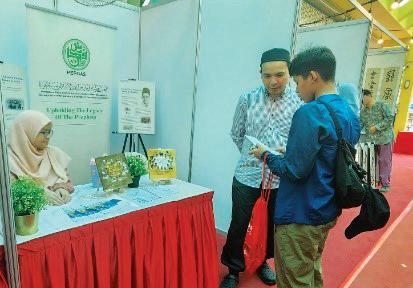
31 Julai 2023 & 17 September 2023
Pelajar-pelajar MPP telah melakukan Ziarah Muhibbah ke dua buah rumah, satu adalah menziarahi FA klien Pergas iaitu Encik Kadiron dan isterinya dari Jam 3:15 petang hingga 4:00 petang. Kemudian pada tarikh 17 September pulak, para MPP telah juga menziarahi rumah salah satu Masyaikh Pergas, Ustaz Mohamad Hasbi Hassan, dari jam 5:30 petang hingga 6:30 petang.



AKTIVITI PERGAS AKTIVITI PERGAS
JUL 27 28
Julai, Ogos & September 2023
Latihan ini merupakan kerjasama pihak Jabatan Pendidikan Pergas dan Fakulti Pendidikan, Universiti Teknologi Malaysia. Latihan ini tertumpu kepada tiga kemahiran utama iaitu kemahiran Pengajaran
Pembelajaran Kontemporari, kemahiran Penilaian dan Pentaksiran serta kemahiran Refleksi Kendiri Pengajaran
Pembelajaran. Ketiga-tiga kemahiran ini mendokong model pembelajaran SCL (Student Centered Learning). Setiap kemahiran disokong dengan modul-modul yang dapat membantu peserta meraih kemahiran yang ditetapkan.
Latihan ini telah dihadiri oleh 26 asatizah sepenuh dan separuh masa. Ia telah dijalankan secara pembelajaran teradun (blended learning) pada tarikh-tarikh berikut:
Komponen Sesi Pensyarah
Dan Pentaksiran
Kemahiran Refleksi
Kendiri Pengajaran
Pembelajaran Sesi 6



2023
AUG
2 Ogos 2023
Siri E-Hadith secara LIVE di Facebook bersambung lagi bersama Ustazah Dr Sakinah Saptu pada 2 Ogos 2023 yang telah membincangkan hadith ke-19 (Bahagian 2) tentang perihal meminta pertolongan dan doa kepada Allah s.w.t

25 Julai 2023 & 1 Ogos 2023
Kursus Intensif Bahasa Arab telah dijalankan pada tarikh tersebut dari jam 9:30 pagi – 2:00 petang dan seramai 30 pelajar telah menghadiri kursus ini. Ia dikendalikan oleh Ustaz Hamzah bin Mohd Nordin dengan menggunakan buku Qotrun Nada li Ibni Hisyam.


4 Ogos 2023
Bengkel Keganasan Rumahtangga untuk pelajar-pelajar Madrasah
diadakan pada 4 Ogos 2023, dari jam 8 malam – 9 malam di Masjid Al-Khair yang telah disampaikan oleh Ustazah Zahratur Rofiqah.
Seramai 60 Murid daripada
Madrasah Al-Khair telah hadiri bengkel tersebut.


14 Ogos 2023
Webinar AISP telah berjaya diadakan pada 14 Ogos 2023 dengan 84 asatizah yang telah mengambil bahagian dan memfokuskan kepada: Memperhalusi Pemikiran Melalui Pandangan Dunia Islam – Retreat Webinar AISP 2023. Para peserta telah dibimbing untuk merenungkan pandangan dunia Islam dan mendapatkan pandangan tentang cara untuk melibatkan diri dengan isu-isu kompleks dan trend yang muncul dalam masyarakat yang pelbagai melalui refleksi pandangan dunia yang jelas. Webinar ini telah disampaikan oleh 3 pensyarah: Assoc. Prof. Dr Wan Suhaimi Wan Abdullah, Shaykh Dr Hisham A. Hellyer dan Shaykh Dr Tarek Algawhary.



17 Ogos 2023
Program Radio Pergas bersama DJ Hos Ustaz Syed Matiin bersama
Asatizah Undangan, Ustaz
Sheikh Umar Abdul Aziz, yang telah membahaskan faktor utama dalam mencari pasangan menurut pandangan agama, dan cara menghadapi masalah perceraian dalam hubungan.

24 Ogos 2023
Latihan Celik Kewangan merangkap Pelantikan Rasmi asatizah wanita telah berlaku pada 24 Ogos 2023 di Wisma Geylang Serai.


AKTIVITI PERGAS AKTIVITI PERGAS
Tarikh Mod Tempoh
Sesi 1 PM Dr Hasnah Mohamed 14 Jul 2023 Online 2 jam Sesi 2 15 Jul 2023 FTF 4 jam
Kemahiran Pengajaran Pembelajaran Kontemporari
Kemahiran Penilaian
Sesi 4 Dr Ibnatul Jalilah Binti Yusof & Dr Sanitah Bte Mohd Yusof 11 Ogos 2023 Online 2 jam Sesi 5 12 Ogos 2023 FTF 4 jam
Online 2 jam
FTF 4 jam
Dr Sanitah Bte Mohd Yusof 8 Sept 2023
Sesi 7 9 Sept
29 30
5 September 2023
Program Radio Pergas bersama DJ Hos Ustaz
Syed Matiin bersama Asatizah Undangan, Ustazah
Fifiazlina Binte Jalil, yang telah membincangkan mengenai tatacara sebagai seorang anak murid, dan bagaimana menjadi insan yang berjaya dalam kehidupan yang penuh onak cabaran ini.
Terdapat segmen Renovasi Qalby yang dibawa khas oleh Masjid Haji Muhammad Salleh Maqam Habib
Noh yang telah disampaikan oleh Ustaz Nor Razak
Bin Bakar, dan telah membawa tajuk “Cinta Para
Sahabat Terhadap Rasulullah ﷺ”, pada jam 1:45 petang.
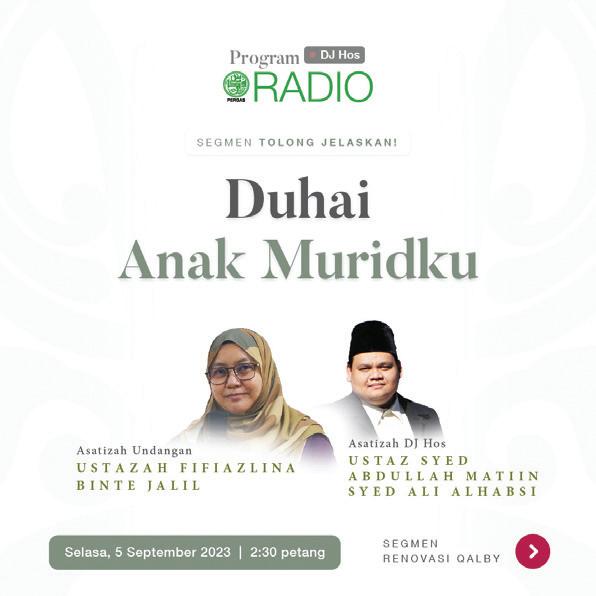

7 September 2023
Program Radio Pergas bersama DJ Hos Ustaz
Syed Matiin bersama Asatizah Undangan, Ustaz Mochamad Sandisi yang telah membincangkan mengenai hubungan murid-guru yang menuntut penghormatan dan kasih sayang.
Terdapat segmen Renovasi Qalby yang dibawa khas oleh Masjid Haji Muhammad Salleh Maqam Habib
Noh yang telah disampaikan oleh Ustaz Nor Razak
Bin Bakar, dan telah membawa tajuk “Pelajaran Di
Sebalik Pernikahan Rasulullahh ﷺ bersama Saiyidatina
Khadijah RA”, pada jam 1:45 petang.


13 Sept, 15 & 18 Okt 2023
Sesi Diskusi Ilmiah ini bertujuan memberi pendedahan kepada para pelajar untuk menyelidik lebih mendalam isu yang berkaitan dengan topik yang telah dibincangkan. Selain daripada merujuk kepada kitab-kitab, para pelajar diberi peluang berinteraksi dan berbincang bersama Asatizah ataupun pakar yang berpengalaman dalam bidang masing-masing. Berikut adalah sesi-sesi yang telah berlangsung pada Jul-Dis:
Ulum Al-Quran: Sains Dalam Al-Quran
Pada sesi ini, para pelajar diajak untuk menganalisa falsafah dan kepentingan sains berhubung dengan al-Quran. Para pelajar akan didedahkan dengan metodologi penafsiran ayat-ayat kauniyyah dan kaedah aplikasi sains terhadap ayat-ayat tersebut.
Sehubungan dengan itu, para pelajar juga akan diajak untuk mengkaji isu-isu serta cabaran semasa dalam penggunaan ilmu sains sebagai suatu alat dalam menafsirkan al-Quran.
➥ 13 Sept: Ustaz Dr Firdaus Yahya
Usul Fiqh: Proses Pengeluaran Fatwa Di Singapura
Pada sesi ini, para pelajar diajak untuk menganalisa maksud sebenar ayat-ayat Nusyuz di dalam Al-Quran, khususnya ayat 34 & 128 dalam Surah An-Nisa. Para pelajar akan membuat perbandingan akan maksud nusyuz yang pelbagai dan akan mengenalpasti fahaman dan tafsiran yang wasatiy terhadap ayat-ayat tersebut.
Sehubungan dengan itu, para pelajar juga akan diajak untuk mengkaji isu keganasan domestik dalam rumahtangga hari ini. Mereka akan didedahkan dengan fakta serta kajian terkini berkaitan isu tersebut.
➥ 28 Okt: Ustazah Dr Siti Nur ‘Alaniah Abdul Wahid
➥ 15 Okt: Ustaz Dr Rizhan Bin Leman

AKTIVITI PERGAS AKTIVITI PERGAS
SEP
31 32
12 September & 10
Disember 2023
Telah dijalankan sesi Webinar
pada 12 September dengan topik
“Meneroka Warisan Nabi Muhammad
SAW dalam membuat keputusan” yang disampaikan oleh Ustazah
Dr Rohana Ithnin dan pada 10
Disember 2023 dengan topik
“Memahami konsep takdir dalam dunia yang kucar kacir” yang disampaikan oleh Ustazah Nadia Hanim Abdul Rahman beserta memasarkan program-program IPIP dengan
kerjasama Jabatan Marcom dan Majlis Pelajar Pergas.
15 September 2023
Forum Bersamamu telah dijalankan pada tarikh 15 September 2023 di Masjid Sultan.
Program Ihya’ Rabiul-Awwal 1445H
Bersempenakan bulan kelahiran Baginda s.a.w., Majlis Ihya’ Rabi’ul-Awwal: Mengenal Sang
Kekasih anjuran bersama Tradisi Halaqah & Pergas, dengan sokongan Wans Education 21 telah dijalankan dengan pembacaan Kitab AlAmin & Dalail al-Khairat yang dikendalikan oleh
Ustaz Muhammad Hasyim Bin Masnin dengan berkonsepkan talaqqi pada tarikh 16, 17, 23 & 24
September 2023 dari jam 8 malam – 9 malam juga telah diadakan malam kemuncak serta khataman kitab & pembacaan Maulid ad-Diba’ie pada tarikh 27 September 2023, dari jam 7.30 malam - 9.30 malam.







19 September 2023


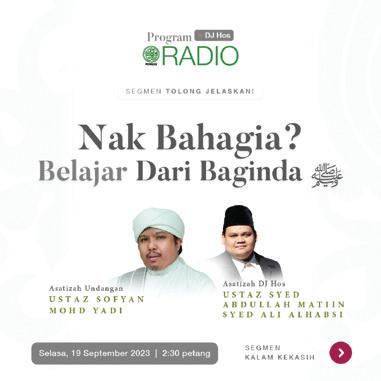
Program Radio Pergas bersama DJ Hos Ustaz
Syed Matiin dan Asatizah Undangan, Ustaz
Sofyan Mohd Yadi yang telah berkongsi
bagaimana dengan mengikuti ajaran Baginda s.a.w., kita mampu menghadapi cabaran hidup dengan penuh kesabaran, keadilan, dan keteladanan.
Telah diadakan juga segmen kalam kekasih khas
Syamail Muhammadiyah bersama Ustazah Nur
Huraidah Jumat yang telah mengupas episod ke-13 mengenai sarban dan kain lapisan kepala
Rasulullah ﷺ, jam 1:15 petang.
Terdapat juga segmen Renovasi Qalby yang
dibawa khas oleh Masjid Haji Muhammad Salleh
Maqam Habib Noh yang telah disampaikan oleh
Ustaz Nor Razak Bin Bakar, dan telah membawa
tajuk “Bagaimana Nabi s.a.w. Menggemberikan Orang Lain”, pada jam 1:45 petang.
24 September 2023
Majlis Hari Asatizah diadakan pada 24 September 2023 di Tiara Waterfront jam 3.00 petang hingga 6.00 petang. Dihadiri oleh Asatizah IPIP dan Majlis Pelajar Pergas. Majlis dimeriahkan lagi dengan pemberian hadiah istimewa di antaranya pakej Umrah bagi cabutan nama Asatizah yang bertuah.
21 September 2023
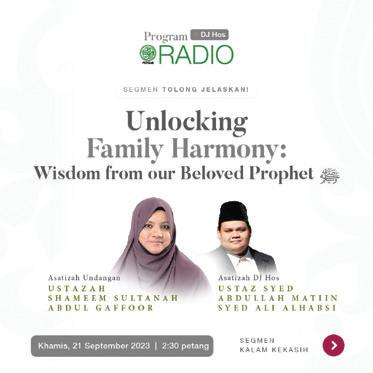


Program Radio Pergas bersama DJ Hos Ustaz Syed Matiin dan Asatizah Undangan, Ustazah Shameem Sultanah Abdul Ghafoor yang telah berkongsi bagaimana Rasulullah s.a.w.
merupakan contoh teladan sesuai pada setiap masa, zaman dan situasi, apatah lagi di sebuah institusi keluarga.
Telah diadakan juga segmen kalam kekasih khas
Syamail Muhammadiyah bersama Ustazah Nur Huraidah Jumat yang telah mengupas episod ke-14 mengenai Kain Sarung dan Cara Berjalan Rasulullah ﷺ, jam 1:15 petang.
Terdapat juga segmen Renovasi Qalby yang
dibawa khas oleh Masjid Haji Muhammad Salleh
Maqam Habib Noh yang telah disampaikan oleh
Ustazah Nadia Hanim Abdul Rahman, dan telah
membawa tajuk “Romantika Rumah Tangga Baginda s.a.w.”, pada jam 1:45 petang.

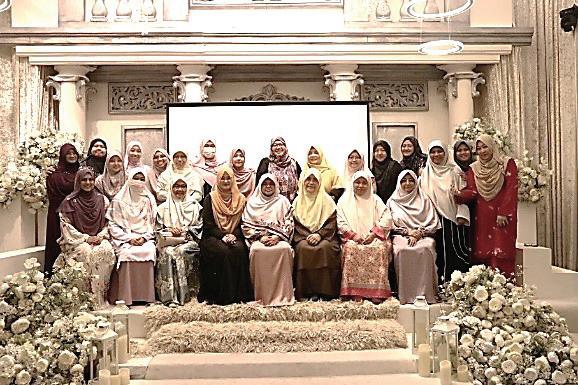

AKTIVITI PERGAS AKTIVITI PERGAS
33 34
30 September 2023
Webinar yang telah disampaikan oleh Ustazah Noraini Abdul Wahab ini bertujuan untuk membangunkan pemahaman yang betul tentang kesedihan sebagai tindak balas semula jadi dan individu terhadap kehilangan, melengkapkan asatizah untuk membantu individu mengelakkan stigmatisasi dan menyalahkan diri sendiri. Memahami kesedihan dan kehilangan akan membantu individu mengembangkan belas kasihan (rahmah) untuk diri
mereka sendiri dan orang lain sambil memproses kesedihan mereka dengan selamat dan mencapai penerimaan untuk memulakan pembinaan semula.


4 Oktober 2023
Siri E-Hadith secara LIVE di Facebook bersama Ustazah Dr
Sakinah Saptu pada 4 Oktober 2023 yang telah membincangkan hadith ke-20 dan menjelaskan bagaimana malu itu dapat meningkatkan keimanan kepada Allah s.w.t dan memperbaiki jati diri Muslim.

8 Oktober 2023
Masjid Kassim telah mengadakan
Majlis Maulidur Rasul dan disokong oleh Pergas untuk Forum Perdana yang telah diadakan dengan mengundang Ustazah
Nadia Hanim Abdul Rahman (salah satu MTP Pergas) untuk menjadi salah satu panelist bagi forum tersebut dan telah juga mendirikan bazaar secara percuma.


10 Oktober 2023
Program Radio Pergas bersama DJ Hos Ustaz Syed Matiin bersama Asatizah Undangan, Ustazah Fatini Binti Khaider yang telah berkongsi bagaimana Sunnah Baginda ﷺ kekal relevan dan sentiasa mekar dan segar walau berubah zaman.
Terdapat segmen Kalam Kekasih khas Syamail Muhammadiyah bersama Ustazah Nur Huraidah
Jumat yang telah mengupas episod
ke-15 mengenai Cara duduk
Rasulullah ﷺ, pada jam 1:15 petang.
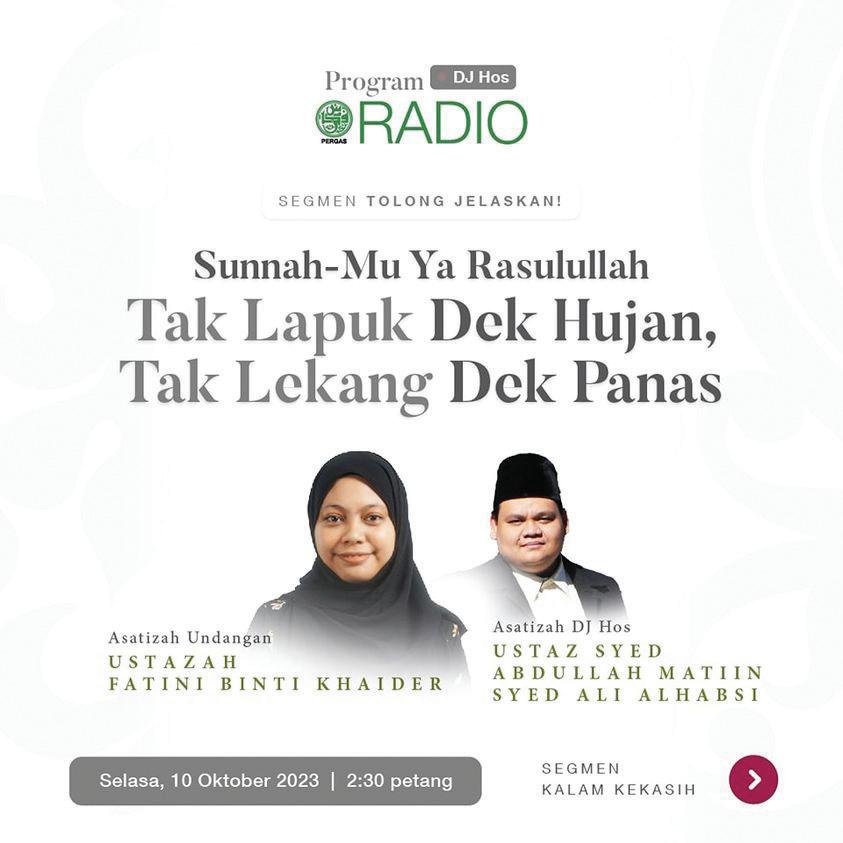
12 Oktober 2023
Program Radio Pergas bersama
DJ Hos Ustaz Syed Matiin dan Asatizah Undangan, Al-Habib
Mahdi Bin Abu Bakar AlHamid, yang telah membincangkan perihal apakah dasar cinta dan bukti sayang kita terhadap
Rasulullah ﷺ
Terdapat segmen Kalam Kekasih
khas Syamail Muhammadiyah
bersama Ustazah Nur Huraidah
Jumat yang telah mengupas
episod ke-16 mengenai alat & cara
Rasulullah ﷺ bersandar, pada jam 1:15 petang.


17 Oktober 2023
Program Radio Pergas
bersama DJ Hos Ustaz
Syed Matiin dan Asatizah
Undangan, Ustaz Ahmad Faritz
Mohamed Hairudin yang telah membincangkan bagaimana hikmah yang dipelajari daripada kisah-kisah Baginda ﷺ dapat memperkuatkan ummat dalam menghadapi cabaran masa kini dan akan datang.
Terdapat segmen Kalam Kekasih khas Syamail Muhammadiyah bersama Ustazah Nur Huraidah
Jumat, yang telah mengupas episod ke-17 mengenai cara makan Rasulullah ﷺ, pada jam 1:15 petang.
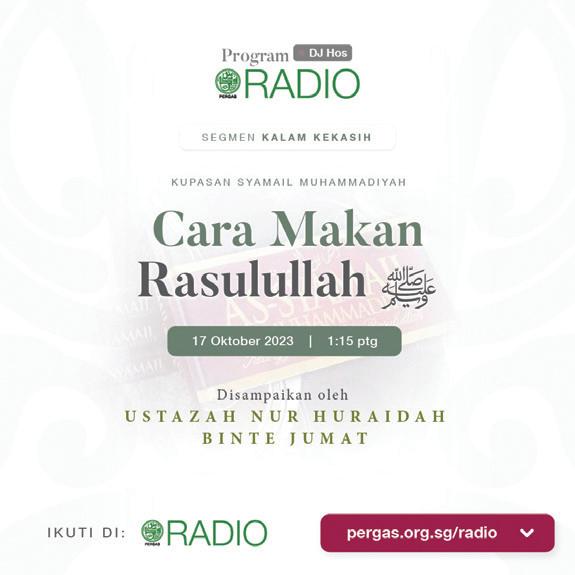

OCT
19 Oktober 2023
Program Radio Pergas bersama DJ Hos Ustaz Syed Matiin dan Asatizah Undangan, Ustazah
Mohamed Tajuddin Bin Noor yang telah membincangkan cara menghadapi badai dalam berumah tangga dan mendapatkan kekuatan dalam usaha menanganinya.
Telah diadakan juga segmen kalam kekasih khas Syamail Muhammadiyah bersama Ustazah Nur Huraidah Jumat yang telah mengupas episod ke-18 mengenai ciri roti Rasulullah ﷺ, pada jam 1:15 petang.


AKTIVITI PERGAS AKTIVITI PERGAS
35 36
19 Oktober 2023
Pergas, dengan kerjasama Masjid Kassim telah melaksanakan Solat Hajat secara berjemaah khususnya demi keamanan dan kesejahteraan penduduk di Palestin dan juga bagi umat Islam di seluruh dunia, dan telah diimamkan oleh Ustaz Muhammad Tarmizi Abdul Wahid.

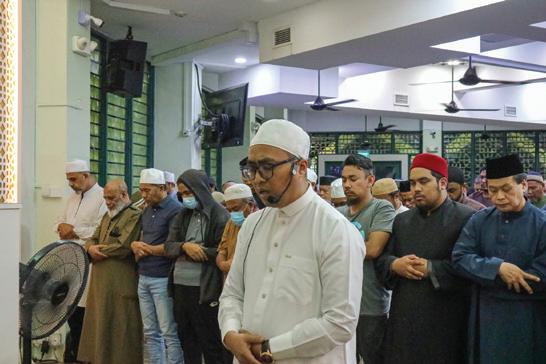

21 Oktober 2023
“For Those Dealing with Infidelity”
Webinar yang telah dikendalikan oleh Ustaz Muhammad Abu Sufian Bin Hanafi bertujuan dalam membincangkan secara ringkas dua konsep yang boleh digunakan oleh bakal kaunselor keluarga, dan dalam konteks ini, asatizah. Pertama, corak kafir, dan kedua, penilaian keluarga. Ia akan berusaha untuk menerangkan bagaimana kedua-dua konsep ini dikaitkan dengan memahami proses komunikasi dalam keluarga, dan cara mengukuhkan proses ini untuk melindungi daripada perselingkuhan.

24 Oktober 2023
Program Radio Pergas bersama
DJ Hos Ustaz Syed Matiin dan
Asatizah Undangan, Ustazah
Nisha Mohd Hussein yang telah
membincangkan bagaimana kita
boleh menjadi pasangan suami
isteri yang berwibawa dan berjaya
dalam membina bersama bahtera
rumah tangga yang penuh dengan
kebaikan di sisi Allah.
Terdapat segmen Kalam Kekasih
khas Syamail Muhammadiyah
bersama Ustazah Nur Huraidah
Jumat yang telah mengupas episod
ke-19 mengenai Lauk Pauk yang
dimakan Rasulullah ﷺ (bahagian 1), pada jam 1:15 petang.
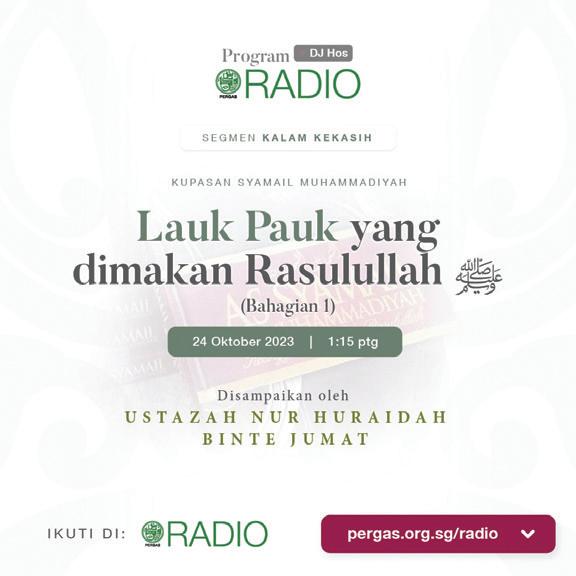
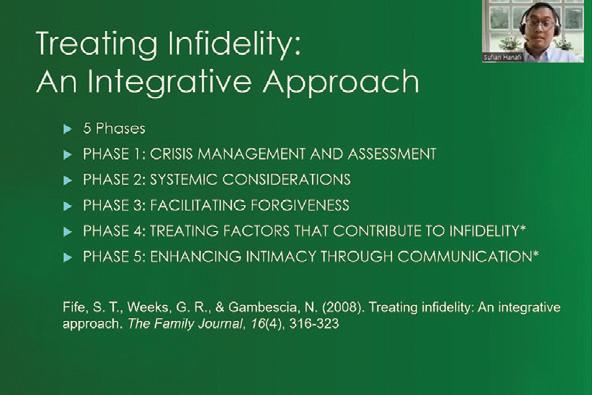
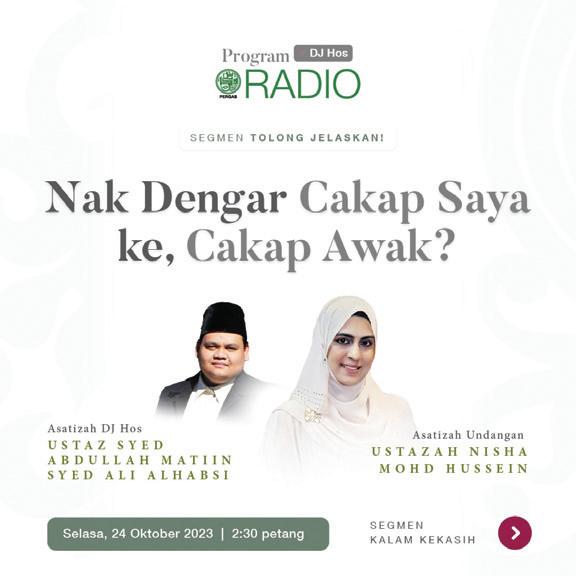
29 Oktober, 4 & 5
November 2023
26 Oktober 2023
Program Radio Pergas bersama
DJ Hos Ustaz Syed Matiin dan
Asatizah Undangan, Ustaz
Mokson bin Mahuri yang telah
membincangkan apakah cinta itu yang indah sahaja, atau adakah ia pengorbanan dan ujian badai
yang melanda?
Terdapat segmen Kalam Kekasih
khas Syamail Muhammadiyah bersama Ustazah Nur Huraidah
Jumat yang telah mengupas episod
ke-20 mengenai Lauk Pauk yang
dimakan Rasulullah ﷺ (bahagian 2), pada jam 1:15 petang.


Focus Group Discussion telah diadakan pada 29 Oktober, 4 & 5 November 2023 dan setiap sesi telah dihadiri oleh 5 asatizah dan belia dan sesi itu dipengerusikan oleh pasukan Monumental Project dengan tujuan untuk mengetahui lebih lanjut tentang bagaimana belia Islam memahami akidah dan sumber kesihatan mental yang terdapat dalam masyarakat Islam.

5 November 2023
1 November 2023
Siri E-Hadith secara LIVE di Facebook bersama Ustazah Dr Sakinah Saptu pada 1 November 2023 yang telah membincangkan hadith ke-21 dimana hadith itu menjelaskan bagaimana cara untuk merealisasikan istiqamah dalam ketaatan dan kebaikan.

Seminar IPIP yang bertajuk “Mencapai Keamanan melalui Wasatiyyah: Panduan Pelajar terhadap Isu Semasa” telah dijalankan pada 5 Nov 2023 secara hybrid di Madrasah Aljunied Al-Islamiah dan dalam talian. Sesi tersebut telah disampaikan oleh Ustaz Dr Muhammad Haniff Bin Hassan.
Seminar ini bertujuan untuk memberikan panduan praktikal kepada pelajar mengenai cara mengaplikasikan pendekatan Wasatiyyah dalam menghadapi isu-isu semasa. Ia menekankan peri pentingnya nilai-nilai kemanusiaan, ihsan, kesederhanaan, dan aspek-aspek lain yang diperlukan untuk memelihara kedamaian, harmoni, dan keamanan, baik bagi diri individu mahupun dalam masyarakat secara keseluruhannya.

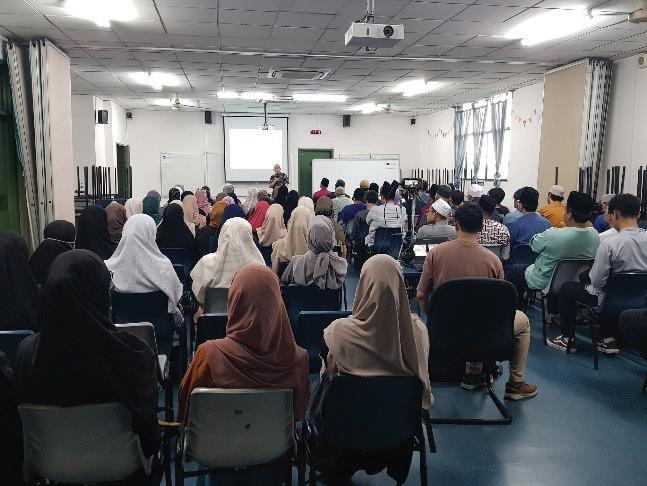
AKTIVITI PERGAS AKTIVITI PERGAS
37 38
1,2,15 & 16 November 2023
Program Pembangunan
Kerjaya Eksekutif
Program yang telah dijalankan pada tarikh 1,2,15 & 16 November 2023
ini, berkolabarasi bersama Syarikat
Asian Leaders Institute telah dihadiri oleh seramai 16 Asatizah.

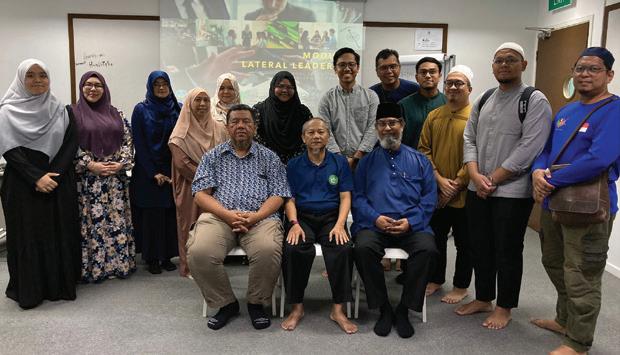
13 November 2023
“Marital First Responder Training”
Salah satu program kaunseling
Pergas yang telah dikendalikan
oleh Ustaz Mohammed Nazim
Bin Rahuma Dulla bertujuan untuk memperkasakan “penjawab pertama” untuk mengelakkan isu perkahwinan daripada merosot, dengan membina keupayaan mereka untuk memberikan bimbingan dan nasihat perkahwinan yang penting. Ia unik kerana ia melatih para asatizah untuk membantu orang lain dalam rangkaian sosial mereka yang sedia ada, serta individu/pasangan dalam masyarakat umum.

14 November 2023
Program Radio Pergas bersama
DJ Hos Ustaz Syed Matiin pada 14
November 2023 bersama Asatizah
Undangan, Ustazah Noraini
Abdul Hamid Abdul Wahab
yang telah membincangkan tentang apakah kesan dan cara
menghadapinya tatkala seseorang
itu menghadapi kesedihan dan
kehilangan dalam konteks Islam.
Terdapat segmen Kalam Kekasih
khas Syamail Muhammadiyah
bersama Ustazah Nur Huraidah
Jumat yang telah mengupas episod ke-21 mengenai Cara Wudhu’ Rasulullah ﷺ, pada jam 1:15 petang.


NOV
16 November 2023
Program “Imam Development” untuk pelajar-pelajar Muslimin dari
SURM telah diadakan pada tarikh 16 November 2023, jam 8 pagi-12 tengahari yang dikendalikan oleh Ustaz Ahmad Rushdy Mohamad
Ariff. Program untuk Muslimah pula yang dikendalikan oleh Ustazah Nadia Hanim juga diadakan di SURM untuk pelajar-pelajar Muslimah.

Ramai wanita kita berkonflik dengan Krisis Kemanusiaan di Gaza yang meragut banyak nyawa yang tidak bersalah, terutamanya wanita dan kanak-kanak.
Apa yang boleh mereka lakukan untuk menangani perasaan ini?
PPIS dan Pergas telah bekerjasama dalam program “Bulatan Penjagaan Semua Wanita” ini, [Heart. Heal. Hope] yang menghayati nilai-nilai Sakinah (ketenangan), Mawaddah (kasih sayang), dan Rahmah (belas kasihan), dan mengukuhkan kesejahteraan mental kita dalam masa yang sukar ini, dikendalikan oleh Puan Nuraida Khalid yang telah membongkar Rangka Kerja Ketahanan Psiko-Sosial, diikuti dengan perkongsian oleh Ustazah Nadia Hanim dalam “Panduan Kesihatan Mental” bagi mereka yang bergelut dengan krisis di Gaza.
18 & 25 November 2023
Bengkel penulisan “Skillful Writing for Purposeful Guiding”
Bengkel ini telah diadakan pada tarikh 18 & 25 November 2023, dari
Jam 9 pagi – 3:30 petang di Wisma Indah, Pergas dan dikendalikan oleh
Ustaz Jakfar dan Cikgu Anuar Othman daripada Madani Institute.

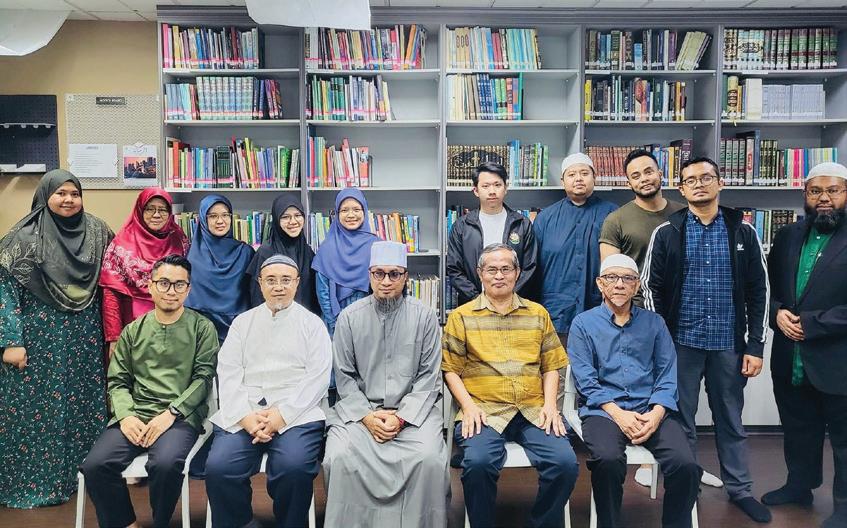
19 November 2023
Learning Journey bagi pelajar SPI remaja diadakan pada 19
November 2023 di Pergas Green Space (PGS).



20 November 2023
Sesi Knowing Our Thinkers
Pembentangan Tesis bertajuk
“An Analysis on the selected Fatwa of Syed ‘Alwi Ibn Tahir al-Haddad, The Fourth Mufti of Johor”, telah diadakan secara dalam talian dari jam 8:00 malam hingga 10:00 malam. Pembentangan itu telah disampaikan oleh penulis tesis tersebut, Ustaz Syakir bin Pasuni.

AKTIVITI PERGAS AKTIVITI PERGAS
39 40
21 November 2023
Program Radio Pergas bersama
DJ Hos Ustaz Syed Matiin dan
Asatizah Undangan, Ustaz Ahmad
Helmi Mohamad Hasbi yang
telah membincangkan konsep
Wasatiyyah, dan kepentingan sifat
keseimbangan umat Islam dalam
menghadapi cabaran masa kini.
Terdapat segmen Kalam Kekasih
khas Syamail Muhammadiyah
bersama Ustazah Nur Huraidah
Jumat yang telah mengupas episod
ke-22 mengenai Ucapan Rasulullah
ﷺ sebelum & selepas makan, pada jam 1:15 petang.

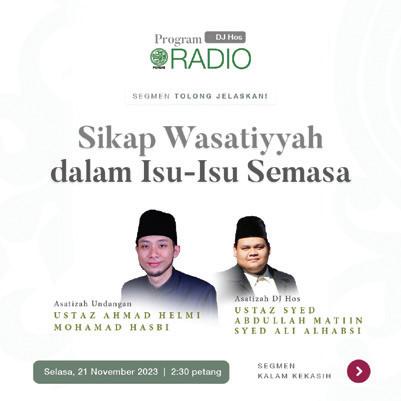
26 & 28 November 2023
Majlis konvokesyen pelajar
MIRKH & BIRKH telah
diadakan pada 26 & 28
November 2023 di Universiti
Islam Antarabangsa Malaysia di Gombak, Kuala Lumpur Malaysia.

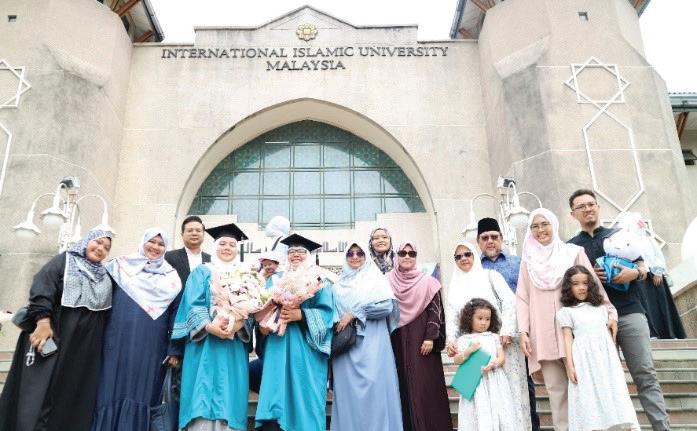
27 November 2023
“For Those Dealing with Addiction”
Ketagihan adalah isu kritikal dalam masyarakat kita. Sebagai asatizah, kami memainkan peranan penting dalam memahami, menyokong, dan membimbing mereka yang menuju ke arah pemulihan.
Webinar interaktif ini adalah salah satu program kaunseling, bersama jurulatih Encik Syawal Hussain disesuaikan untuk asatizah dan telah menawarkan pemahaman asas tentang ketagihan, dengan penekanan khusus untuk memupuk empati, kesedaran dan keupayaan praktikal untuk membantu mereka dalam perjalanan mereka ke pemulihan.


27 November 2023
Reviving Faith Masterclass 2023
Terdapat beberapa buah program yang telah berjaya dijalankan di akhir bulan November dan awal bulan Disember, pada tarikh 27 & 28 November 2023, 2, 5, 9 & 10 Dec 2023, oleh Pergas bersama rakan kongsi strategik yang terdiri daripada beberapa buah organisasi seperti Tradisi Halaqah, Nur Insan & lain-lain. Kebanyakan programprogram tersebut dibuka untuk warga umum dan Asatizah.



Disember 2023
Buku Penerbitan Intitusi Pengajian Islam Pergas (IPIP)
1. Nota “An Introduction to Tajwid” telah siap diterjemahkan dari bahasa Melayu ke Bahasa Inggeris dan telah digunakan oleh Pelajar Program Takrif Islam.
2. Buku “Pengantar Ilmu Tasawwuf” telah siap dicetak pada pertengahan Disember 2023 dan digunakan oleh pelajar peringkat Sijil Lanjutan Pengajian Islam.
3. Penulisan buku Tafsir Maudhui yang ditulis oleh Ustaz Dr Mohd Yusri Yubhi Md Yusoff di peringkat Diploma sedang di dalam proses penyemakan oleh pihak Pergas.

10 & 17 Disember 2023
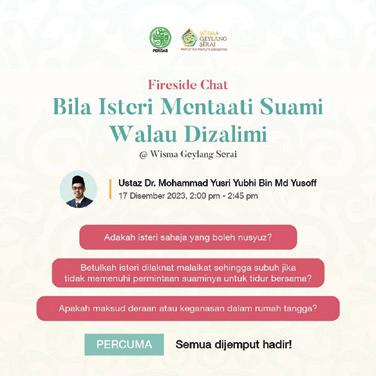


15 Disember 2023
“Be a Samaritan (Suicide Prevention Workshop)”
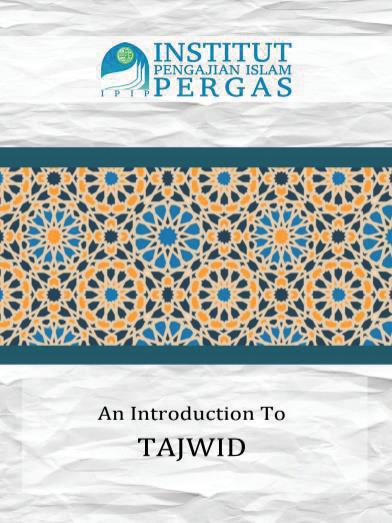

Sesi bual dan diskusi bersama asatizah dengan tema perkahwinan dan kekeluargaan, bersempena program Family Fiesta yang telah dijalankan di Wisma Geylang Serai.
Siri pertama telah disampaikan oleh Ustazah Nurul ‘Izzah Binti Khamsani, dengan memberi tumpuan kepada pengukuhan institusi rumah tangga dengan mengambil inspirasi dari sirah nabawi dan melalui sesi ini, para penonton dapat menghayati tujuan perkahwinan di dalam Islam, memperkasakan masyarakat tentang peranan suami dan isteri di dalam rumah tangga, dan juga memberi inspirasi dan pedoman kepada pasangan melalui sikap dan nasihat Nabi s.a.w.
Sesi kedua pula telah disampaikan oleh Mohd Yusri Yubhi Md Yusoffi yang telah merungkai beberapa salah faham mengenai konsep nusyuz dan ketaatan dalam rumah tangga dan melalui sesi ini, para penonton dapat memahami maksud keganasan rumah tangga, konsep ketaatan di dalam rumahtangga dari perspektif Islam, dan juga beberapa salah faham yang terhasil dari budaya dan jangkaan masyarakat.

Bengkel 2 bahagian yang dikendalikan oleh Ustaz Ahmad Taufiq Muhammad ini bertujuan untuk melengkapkan asatizah dengan pengetahuan dan kemahiran untuk menjadi responden pertama kepada sesiapa yang menghadapi krisis bunuh diri dengan melibatkan dan menggalakkan individu yang tertekan untuk mendapatkan bantuan dan memberikan sokongan emosi kepada mereka secara empati.
29 Disember 2023
Sesi Knowing Our Thinkers
Pre-Departure Tausiyyah telah dijalankan pada hari Jumaat, 29 Disember 2023, dari Jam 8 malam – 9:30 malam dan disampaikan oleh Ustaz Mohammad BahrulUlum secara dalam talian dan seramai 80 pelajar dari pelbagai badan-badan oraganisasi telah menghadiri program ini.

AKTIVITI PERGAS AKTIVITI PERGAS
DEC
41 42
Penulis:
Syaari Ab Rahman
Ustaz Muhammad Syaari Ab Rahman
ialah anak kelahiran Tumpat, Kelantan dan merupakan Jurulatih Utama sepenuh masa di syarikat milik beliau sendiri, Paradigma
Ibrah Sdn Bhd. Merupakan seorang graduan
Ijazah Sarjana Muda Bahasa dan Sastera
Arab dari Universiti Islam Antarabangsa Malaysia. Memperolehi Ijazah Sarjana
dalam bidang Pengajian Al-Quran Dan
Al-Sunnah daripada Universiti Kebangsaan Malaysia (UKM).
Beliau kini berpengalaman lebih dari 6
tahun dalam dunia latihan dan motivasi, selain merupakan ahli berdaftar di bawah
Pertubuhan Perunding Latihan Dan Motivasi
Muslim Malaysia (TAMRIN). Pernah dijemput sebagai panel dalam rancangan
Positif (TV3), Salam Muslim (Astro Oasis), Assalamualaikum (TV Al-Hijrah) dan panel tetap selama 4 tahun (2012-2016) di segmen
Ibrah kendalian Radio Institut Kefahaman
Islam Malaysia, IKIM.fm.

Publisher: Iman publication
ISBN: 978-983-2423-78-2
Ulasan Buku Ditulis Oleh: Nuhaa Fithriyah Binte Isa
ULASAN BUKU
PerempuanYang Baik-Baik Dalam Al-Quran
Pada pendahuluan buku Perempuan yang
Baik-Baik dalam Al-Quran karangan Ustaz
Syaari Ab Rahman, beliau menerangkan tentang cara-cara kisah wanita diceritakan dalam Al-Quran. Adakalanya, ia dalam bentuk naratif, dialog, berulang kali dalam surah yang berbeza, atau hanya disebutkan sekali sahaja dalam Al-Quran. Hanya dengan tafsir dan tadabbur yang mendalam, pembaca dapat menyelami kandungan kisahkisah tersebut dengan lebih terperinci.
Setiap nama-nama wanita dalam buku ini terdapat kisah hidup mereka yang boleh kita jadikan panduan apabila seseorang itu menghadapi ujian. Boleh jadi apa yang kita lalui tidak sama dengan apa yang mereka lalui, tetapi apa yang mereka lakukan apabila menghadapi ujian tersebut dapat dijadikan iktibar Berikut ini, saya bakal mengulas tentang bab-bab tentang wanita Muslimah yang dibicarakan pada buku ini.
TINTA ILMU TINTA ILMU
43 44
Pada bab pertama, Allah menceritakan dalam Surah An-Nisaa mengenai kemuliaan seorang wanita, dan ikon wanita dalam surah ini adalah isteri ‘Imran. Allah memuliakan isteri ‘Imran dengan diceritakan mengenai wawasannya terhadap anak di dalam kandungannya. Walaupun nasib tidak berpihak padanya, dia tetap berpegang teguh dengan pendiriannya dan menyerahkan segalanya kepada Yang Maha Merancang.
Pastinya kita akan tertanya, apakah kita boleh dan mampu menjadi seorang perempuan yang mulia, terutama sekali pada zaman yang moden ini? Jawapannya boleh didapati di dalam surah An-Nisaa.
Seterusnya dalam bab ini juga, ada disebutkan mengenai bagaimana potensi dan taraf seorang wanita itu sebenarnya sama sahaja dengan seorang lelaki. Ada dua sebab; yang pertama, tidak akan berkembang keturunan manusia tanpa seorang perempuan, dan yang kedua, tugas memakmurkan alam dan hubungan sesama manusia adalah tugas untuk kedua belah pihak perempuan dan lelaki. Oleh itu, janganlah kita merendahkan martabat kaum wanita kerana itu akan menyamai zaman jahiliyyah. Sedangkan Islam telah mengangkat darjat seorang wanita itu dengan setinggi-tingginya.
Pada bab yang seterusnya, telah menceritakan mengenai Ibu Nabi Musa,
dimana beliau adalah seorang yang sangat berani dalam menyelamatkan anaknya Nabi Musa a.s. Dalam situasi yang bahaya itu pun, dia tetap rela menghanyutkan anaknya di
sungai Nil seperti yang disebut dalam surah
Al-Qasas ayat 7:
Ertinya: Dan Kami ilhamkan kepada ibu Musa:
“Susukanlah dia; dalam pada itu, jika engkau
takutkan sesuatu bahaya mengenanya (dari angkara
Firaun), maka (letakkanlah dia di dalam peti dan)
lepaskanlah dia ke laut; dan janganlah engkau
merasa bimbang dan jangan pula berdukacita; sesungguhnya Kami akan mengembalikannya
kepadamu, dan Kami akan melantiknya menjadi
salah seorang dari Rasul-Rasul Kami.” 20.
Jika kita berada di situasi ibu Nabi Musa, pastinya kita akan risau dengan keadaan
anak kita yang jauh dari pandangan
mata kita. Namun, kecekalannya dalam 20. Surah Al-Qasas ayat 7
menyerahkan segalanya pada Allah SWT, dia meyakini bahawa Allah akan menjaga
anaknya dari ancaman bahaya. Daripada
kisah ini, kita boleh belajar bahawa kita seharusnya bergantung kepada Allah dalam
apa jua situasi sekalipun. Janganlah kita
bergantung pada Allah di saat kita susah
sahaja kerana kita lebih memerlukan Allah, sedangkan Allah memerlukan kita.
Diceritakan pula dalam bab ketiga mengenai
seorang wanita yang didatangi Malaikat
Jibril. Beliau sangat dikenali dalam Al-Quran.
Dia bukanlah seorang Nabi mahupun Rasul.
Namun namanya dan kisahnya disebutkan
dalam Al-Quran. Sehinggakan terdapat surah
yang dinamakan selepas beliau. Disebutkan
dalam sebuah hadis, bahawa beliau antara
sebaik-baik Muslimah syurga, iaitu Maryam
binte Imran.
Salah satu kisah Maryam yang boleh
menjadi contoh yang baik khususnya
para Muslimah. Pada suatu ketika dahulu, Maryam sedang mengasingkan dirinya di tempat yang jauh dari orang lain. Tidak
lama kemudian, datangnya seorang lelaki ke
tempat di mana Maryam bersendirian itu.
Bayangkan bagaimana keadaan Maryam
apabila diuji dengan seorang lelaki yang
kedudukannya ketika itu begitu dekat
dengannya, sehingga beliau harus beralih
tempat kerana merasa tidak selesa dengan situasi tersebut. Sebagai seorang wanita
Muslimah, apabila kita berhadapan dengan lelaki ajnabi atau bukan mahram kita, kita seharusnya tahu batasan kita, atau terma yang digunakan adalah ikhtilat iaitu menjaga batasan antara dua jantina. Jika tiada apa yang penting untuk dibicarakan, seelokeloknya tidak perlu memulakan perbualan, kerana ianya boleh menjatuhkan fitnah di mata masyarakat. Persoalannya, siapa lelaki tersebut? Apakah sebab dia berada di situ? Segalanya boleh didapati dalam buku ini.
Ada lagi kisah-kisah lain yang boleh didapati pada bab-bab yang berikutnya seperti kisah isteri-isteri Nabi yang berpaling dari agama yang benar, juga kisah tentang Zulaikha pada zaman Nabi Yusuf a.s.
Secara kesimpulannya, buku Perempuan yang baik-baik dalam Al-Quran ini bukan sahaja sekadar informasi untuk kita membacanya pada waktu lapang, akan tetapi untuk kita bertadabbur serta menghayati kitab AlQuran dengan lebih mendalam. Oleh kerana
Al-Quran terdapat di dalamnya kisah-kisah yang boleh kita mengambil sebagai iktibar dan selami ibrah serta pengajaran kisah tersebut sebagai bekalan dalam kehidupan.
Wallahu A’lam.
TINTA ILMU TINTA ILMU
” اذإ ف هي ع ضرأ نأ سو م مأ لإ ا ن ي حوأو فا ت لو م لٱ ف هي ق لأ ف ه ي ل ع ت ف خ هو ل عا جو ك لإ هودار ا نإ نز ت لو 7 ين ل سر م لٱ ن م
“
45 46
Bismillah.
Ustazah Zahratur
Rofiqah Binte Mochamad Sandisi
Maafkanku, wahai saudaraku.
Pahit dan perit kamu aku saksikan, aku hanya mampu tertunduk malu, memekik bisu
Apakah kamu marah dan kecewa dengan tapak kecilku, wahai saudaraku?
Lukamu yang berdarah, tidak mampu aku tutupi apatah lagi mengubati,
Esakan tangismu menjadi denyutan nadiku, memutuskan urat mataku, mencelikkan kalbu
Sekarang lamunan yang dulunya dibuai puitis si berwibawa, kini bertukar laungan
Tidak pun diendahkan berkali-kali, walaupun berbukit bukti dipersembahkan acapkali
Ingkarnya dunia pada pengorbananmu, hakikatnya ingkar mereka pada kebenaranmu
Nanti apabila neraca menjadi saksi, biarlah yang ingkar menangis mengemis darimu simpati


Masihkah ada lagi senokhtah kemanusiaan di dunia?
Jika hitam tetap megah diputihkan; Erti keadilan hanya cakap-cakap persidangan, dihadiri tangan yang tulus lumpuh kaku
Rumahmu, saudaraku, dirobohkan supaya perompak diberi teduh. Tuan rumah dibuat musuh.
Dentuman kehancuran diberitakan sebagai pembelaan nyawa, adakah betul nyawa berbeza harga?
Ekoran langit dianggap rendah, sempat berjoget buat tayangan dunia, pada Tuhan alpa lupa Kebebasan diukur perairan merah berkunci emas, memangsakan diri hakikatnya kejam perampas
Akan aku membusurkan panah janji, selagi zaitun belum berakar, aku enggan kecut membisu tuli
In Shaa Allah, aku akan menemanimu dengan sorakan takbir, apabila pintu terbuka berbunga Sampai ketemu, wahai saudaraku, biarlah Qubah emas dan batu perindu, menjadi saksi jitu Sedetik lagi, apabila dakapan menjadi satu, aku harap kamu dapat memaafkanku

Maafkanku, wahai saudaraku.
Yang menangisi, Saudaramu
TINTA ILMU TINTA ILMU
Photo Contributor: Touqa Essam Photo Contributor: Geeth Image 47 48
Penerbitan Baru Pergas
Boleh didapati sekarang di: pergas.org.sg/online-bookshop

O B O R U MMA H : JE JA K T O KO H AGAMA I S L AM D I S I N GAPU R A

Obor Ummah Siri 4 ini membawa pembaca ke era 200 tahun yang lalu semasa Singapura moden diasaskan pada tahun 1819. Dengan perkembangan ekonomi Singapura yang begitu pesat pada pertengahan abad 19, ramai peniaga-peniaga Islam khususnya bangsa Arab dan juga bangsa India datang ke Singapura.

The first Arabic translation for the first series of Obor Ummah for those who love reading an Arabic book as it can be use as a source of reference.
B E AC O N S O F THE U MMA H : T R AC I N G THE F O O T S TE P S O F S I N G A P O R E ’ S I S L AM I C
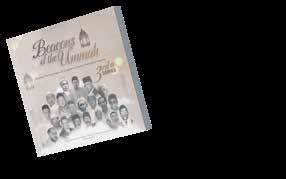
A record of the vast contributions of Islamic religious leaders in Singapore, who consist of religious teachers (asatizah), scholars, and Muslim leaders. They helped in spreading the message of Islam, served as beacons of knowledge and were at the heart of the development of Islam in Singapore from as early as the 15th Century




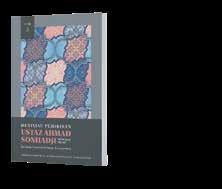
ME N I N JAU P EM I KI R A N U S TA Z A HMAD
S O N HA D J I M O HA MAD MI L ATU DA R I PA DA
Buku 3 jilid ini adalah buku yang pertama yang menghimpunkan semua khutbah-khutbah karangan asli yang ditulis oleh Almarhum Ustaz Ahmad Sonhadji Mohamed dari tahun 1971-1980.


Apakah sebenarnya racun yang menyebabkan diri masih berada di tahap yang sama meskipun berlaku penambahan hari bahkan usia? Menerusi buku ini, penulis menjelaskan musuh sebenar yang melambatkan dan membantutkan kecemerlangan diri.





 By: Zubair bin Mohd Redza
By: Zubair bin Mohd Redza



 By: Huzhaifah Kamal
By: Huzhaifah Kamal






































































































































